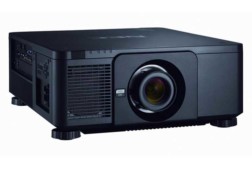What This Education Projector Guide Covers
This guide helps you choose the right Education Projector for schools, colleges, offices, and museum exhibits. Each model is reviewed based on where it works best, so you can quickly find the right fit for your space.
Why Projectors Still Matter
If you want a massive screen without spending a fortune, a projector is still the best choice. For classrooms and businesses, projectors remain the easiest way to go big.
Projector Categories
Meeting Room / Classroom Projectors
Compact, affordable, and simple to set up—ideal for small classrooms or meeting spaces.Conference Room / Lecture Hall Projectors
Larger and brighter models designed for auditoriums, lecture halls, and boardrooms.High-End / Specialty Projectors
Perfect for museums, signage, or creative installations. These models support projection mapping and immersive experiences.
Performance Counts
We focus on how each Education Projector performs in real spaces, not just on paper specs. Our awards highlight models that truly shine in classrooms, lecture halls, and collaborative workspaces.
What You’ll Find in This Guide
Quick summaries of top education and business projectors
Links to detailed reviews and comparisons
Notes on projector families that share similar features
Still Worth Considering
Several projectors from last year’s guide are still strong picks. They remain reliable, budget-friendly options for schools and offices.
Key Buying Factors
Screen Size – For large screens, projectors beat TVs every time. Big classrooms and lecture halls benefit most.
Brightness – Match brightness to room lighting.
Bright, no control: 5000+ lumens
Bright, some control: 3500–5000 lumens
Dim, controlled: 2000–3500 lumens
Fully dark: 800–2000 lumens
Resolution – More pixels mean sharper images.
SVGA (800×600, 4:3)
WXGA (1280×800, 16:10)
1080p (1920×1080, 16:9)
4K UHD (3840×2160, 16:9)
True 4K looks amazing but costs more. Pixel-shifting 4K is a smart compromise—sharper than 1080p while staying affordable.
Installation – Think about mounting, lens shift, maintenance, and remote monitoring. For tips, check our custom installation resources.
EPSON BRIGHTLINK 1485FI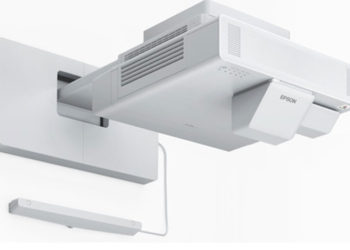
The Epson BrightLink 1485Fi is a powerful Education Projector built for interactive classrooms and collaborative workspaces. It delivers 1080p resolution, 5,000 lumens of brightness, and a low-maintenance 20,000-hour laser light source, making it reliable for daily use in schools or offices.
Big, Flexible Display
The 1485Fi projects a 16:9 image up to 100 inches or a super-wide 16:6 image up to 120 inches. Compared to a 75-inch flat panel, it provides up to 95% more interactive space—perfect for classrooms, blackboards, and conference rooms.
Specs at a Glance
Price: $3,390
Resolution: 1920×1080 (Full HD)
Brightness: 5,000 lumens
Contrast: 25,000:1
Zoom: 1.35x digital
Light Source: 20,000-hour laser
Weight: 14.77 lbs
Designed for Collaboration
The BrightLink 1485Fi supports up to eight touch points, so multiple students or teachers can annotate together. With Epson iProjection software, up to 50 local and remote users can connect, share content, and take turns presenting. Users can interact naturally using either their fingers or Epson pens, just like on a tablet or smartphone.
Smart Connectivity
Built-in Miracast support allows wireless projection from compatible devices—even without Wi-Fi. This makes it ideal for flexible learning, group work, and hybrid classrooms.
Why Choose This Education Projector
The Epson 1485Fi is more than a display—it’s a collaborative learning tool. It enables teachers and students to connect, share, and interact in real time. For schools and workplaces that need reliable performance and easy collaboration, this projector is a future-ready solution.
👉 Check out our Education Projector guide for more classroom-ready models, or explore Epson’s official BrightLink series for full details.
PANASONIC PT-LRZ35U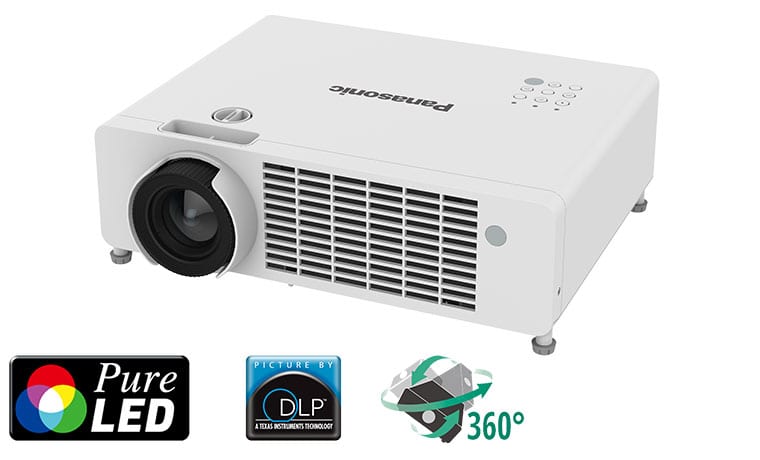
The Panasonic PT-LRZ35 Series is a versatile Education Projector that uses a discrete RGB LED light source for vivid colors and sharp images. It’s perfect for classrooms, lecture halls, and business presentations where color accuracy makes a real difference.
Bright and Accurate Performance
The PT-LRZ35U delivers WUXGA resolution (1920×1200) and 3,500 lumens of brightness, making it suitable for classrooms, corporate boardrooms, and training centers. Its RGB LED engine sets it apart from traditional projectors, earning it an award for outstanding picture performance.
Specs at a Glance
Price: $1,699–$2,999
Technology: RGB LED DLP
Resolution: 1920×1080
Brightness: 3,500 lumens
Contrast: 35,000:1
Zoom: 1.3x
Lens Shift: Yes
Light Source Life: 20,000 hours
Weight: 14.77 lbs
Key Features for Education and Business
USB Type-A 2A Output: Power HDMI streaming devices like Fire Stick or Roku.
Dual HDMI & DIGITAL LINK/LAN: Easy connectivity with HDBaseT support.
Vertical Lens Shift: Flexible placement without distortion.
Network Management: Control multiple projectors, schedule events, and get maintenance alerts.
PJLink Compatibility: Integrates smoothly with other brands in multi-projector setups.
Real-World Performance
In practice, the PT-LRZ35U produces natural, lifelike colors without oversaturation. Its strong brightness and contrast keep visuals sharp in both classrooms and meeting spaces. Combined with compact size and powerful features, this Education Projector is a smart investment for schools and businesses.
👉 For more options, explore our full Education Projector guide. You can also check Panasonic’s official PT-LRZ35 page for detailed specs and resources.
LG HU85LS
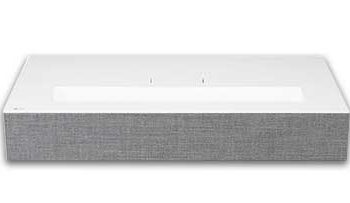
The LG HU85LS is a premium Education Projector that combines 4K UHD resolution, smart features, and an ultra-short throw design. Priced at around $5,999, it’s a space-saving solution for classrooms, meeting rooms, and training spaces where a big screen is needed without complicated installation.
Ultra-Short Throw Convenience
This projector can create a 120-inch image from less than 8 inches away, making it ideal for tight spaces. You can place it on a credenza or table at the front of the room and enjoy a large, sharp display without ceiling mounts or long cables.
Specs at a Glance
Price: $5,999
Technology: DLP (.66” DMD)
Resolution: 2716×1528×2 (perceived 4K UHD 3840×2160)
Brightness: 2,700 lumens
Dynamic Contrast: 2,000,000:1
Light Source Life: 20,000 hours
Weight: 26 lbs
Zoom/Lens Shift: N/A
Key Features
3-Channel Laser System: Separate red and blue lasers plus a blue-phosphor green channel for sharp images, vibrant colors, and minimal rainbow effect.
LG ThinQ AI webOS: The same intuitive smart platform found on LG TVs, offering smooth navigation and built-in apps.
Flexible Audio Options: Built-in speakers are decent, but you can connect via HDMI ARC to an AV receiver for multi-channel sound, including Dolby Atmos.
Why It Works for Education and Business
The LG HU85LS combines great picture quality, smart software, and long-lasting performance. With 20,000 hours of laser life, it reduces maintenance costs while delivering reliable performance. Its ultra-short throw setup makes it perfect for classrooms, conference rooms, and collaborative spaces where every inch of space matters.
👉 Want to compare it with other top options? Check out our Education Projector guide. You can also see more details on the official LG HU85LS page.
VIEWSONIC M2
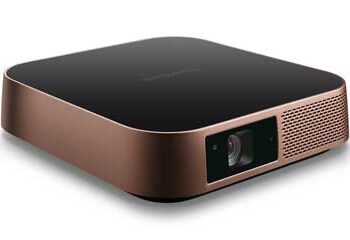
The ViewSonic M2 is a compact and portable Education Projector that combines Full HD resolution, built-in Harman Kardon audio, and smart features in a lightweight design. Priced at $549.99, it’s perfect for small classrooms, offices, dorms, or even a bedroom setup.
Portable Performance
This DLP LED projector delivers 1920×1080 Full HD resolution and 500 ANSI lumens of brightness (1,200 LED lumens). The short-throw lens creates a 100-inch screen from less than 9 feet away, making it ideal for tight spaces like classrooms or meeting rooms.
Specs at a Glance
Price: $549.99
Technology: DLP LED
Resolution: 1920×1080
Brightness: 500 lumens
Contrast: 3,000,000:1
Lamp Life: 30,000 hours
Weight: 2.9 lbs
Smart and Versatile Features
RGBB LED Light Source: Delivers vibrant colors covering 125% of Rec.709 with minimal maintenance.
Harman Kardon Speakers: Dual 3W speakers produce room-filling audio without needing external gear.
Smart OS & Apps: Download Netflix, YouTube, and more via the Aptoide store. Voice control works with Alexa and Google Assistant.
Media Player: Opens Word, Excel, PowerPoint, and PDF files directly from its 16GB storage (10GB user-available) or USB drives.
Optional Wi-Fi: Add a dongle for easy streaming and wireless mobility.
Why It Works for Education and Beyond
The ViewSonic M2 combines portability, sharp visuals, and strong built-in sound. Teachers and presenters can carry it easily between rooms, while students can enjoy it in dorms or small study spaces. It even doubles as a projector for backyard movie nights or casual entertainment.
👉 Learn more about other options in our full Education Projector Buyer’s Guide. You can also visit the official ViewSonic M2 product page for full specifications.
VIEWSONIC LS625W
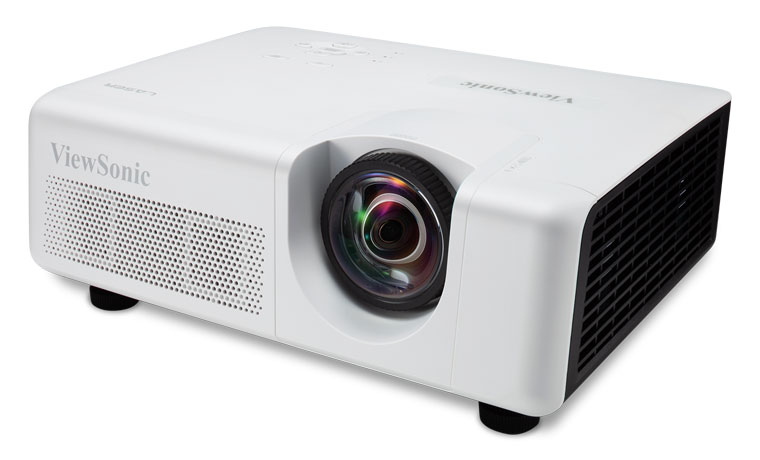
The ViewSonic LS625W is a bright, short-throw Education Projector designed for classrooms and small meeting rooms. With 3,200 ANSI lumens and a long-lasting laser/phosphor light engine rated for 20,000 hours, it delivers a sharp and reliable performance at an affordable price.
Specs at a Glance
Price: $1,439
Technology: DLP
Resolution: 1280×800 (WXGA)
Brightness: 3,200 lumens
Contrast: 100,000:1 (dynamic up to 3,000,000:1)
Lamp Life: 20,000 hours
Weight: 13.7 lbs
Key Features
Short-Throw Design: Projects a 70–100″ image from just 2.6–3.7 feet away, ideal for small classrooms.
Wide Compatibility: Scales video from 640×480 up to 1920×1200, supporting PCs, Macs, and multiple devices.
Built-In Speakers: Two 10W speakers provide enough audio for most classrooms without extra equipment.
Interactive Whiteboard Module: With the ViewSonic PJ-VTOUCH-10S, up to 10 users can annotate directly on the screen using fingers or styluses. Teachers can record and share annotations with students.
Network Management: Easy remote monitoring and control make it convenient for schools and IT staff.
Why It’s Great for Education
The ViewSonic LS625W combines a bright laser light engine, short-throw projection, and interactive features to support engaging lessons. Its widescreen 16:10 aspect ratio makes it perfect for displaying educational content.
👉 Learn more in our complete Education Projector Buyer’s Guide. You can also check the official ViewSonic LS625W product page for detailed specifications.
BENQ EW800ST
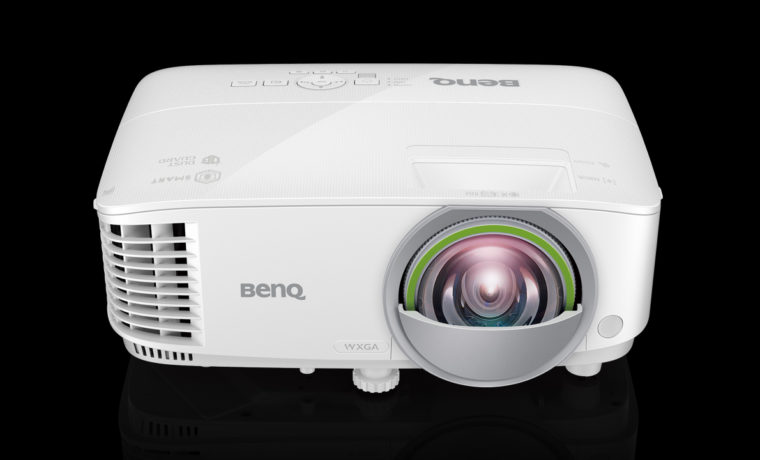
The BenQ EW800ST is a short-throw Education Projector with smart features, designed for classrooms, meeting spaces, and conference rooms. It delivers 3,300 lumens of brightness (up to 4,445 in its brightest mode) and a sharp WXGA 1280×800 resolution. Compact at only 6 lbs, it combines portability with strong performance. Thanks to its innovation, it won the Best in Classroom Smartest Projector Award.
Specs at a Glance
Price: $999
Resolution: WXGA (1280×800)
Brightness: 3,300 lumens
Technology: DLP
Lamp Life: 5,000 hours (10,000 in ECO mode)
Weight: 6 lbs
Smart Classroom Features
The EW800ST projects large, clear images from just a few feet away, perfect for smaller classrooms. While it doesn’t offer touch or pen annotation like some interactive projectors, it includes smart tools to boost teaching efficiency. Teachers can access files through BenQ Personal Cloud Storage and even control the projector via the BenQ Smart Control App.
Connectivity and Audio
This Education Projector supports Wi-Fi and Bluetooth (via a wireless dongle), plus multiple inputs: HDMI, USB, VGA, audio out, and serial control. It has a built-in 2W speaker, good for small classrooms, with options to connect external speakers for larger spaces. Extra features include 3D support and a laser pointer on the remote.
Summary
The BenQ EW800ST is an affordable Education Projector that balances brightness, smart tools, and flexible mounting. With its strong connectivity and classroom-focused features, it’s an excellent choice for everyday teaching and presentations.
👉 Looking for more options? See our Education Projector Guide for top picks across classrooms and business settings. You can also compare with other BenQ projectors to find the best fit for your needs.
EPSON POWERLITE U50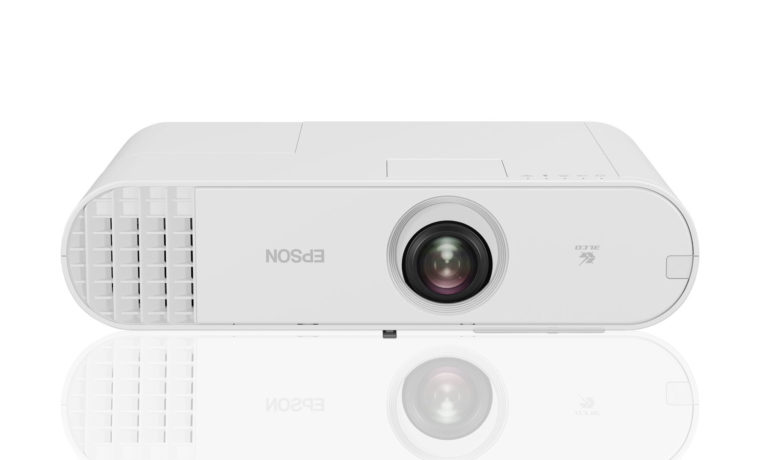
Epson PowerLite U50 – Bright Education Projector for Classrooms and Business
The Epson PowerLite U50 is a 3LCD WUXGA (1920×1200) Education Projector with built-in Wi-Fi. It’s perfect for classrooms, conference rooms, and business spaces that need bright, clear images. With 3,700 lumens of brightness and 3LCD technology, it delivers vibrant pictures even in rooms with ambient light.
Specs at a Glance
Price: $1,149
Resolution: WUXGA (1920×1200)
Brightness: 3,700 lumens
Technology: 3LCD
Lamp Life: 10,000 hours (full) / 17,000 hours (ECO)
Weight: 6.83 lbs
Key Features
The PowerLite U50 supports wireless content sharing through the Epson iProjection App. Up to 50 devices can connect, with four displayed at once—ideal for collaboration. It works seamlessly with Chromebooks, Windows PCs, Macs, iOS, and Android devices.
Networking is flexible, with support for Crestron, AMX, PJLink, and SNMP. Remote management is easy through a web browser, while the 10,000-hour air filter keeps maintenance low.
The built-in speaker is strong enough for classrooms and small conference rooms. The U50 also offers multiple color modes, ensuring accurate images across presentations, lessons, and videos.
Why Choose the Epson PowerLite U50?
This projector is versatile, powerful, and designed for education. Whether you’re teaching in a classroom, presenting in a boardroom, or running a trade show booth, the U50 provides sharp visuals, reliable performance, and smart connectivity.
👉 See more Epson Education Projectors for schools and businesses.
SHARP NEC MC372X
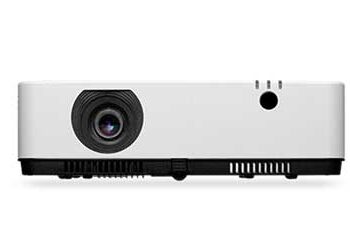
SHARP NEC MC372X – Affordable Education Projector for Classrooms and Offices
The SHARP NEC MC372X is a compact Education Projector designed for classrooms and small offices. With 3,700 ANSI lumens and 3LCD technology, it delivers bright, colorful images even in well-lit spaces. Its long lamp life of up to 15,000 hours in ECO mode makes it a cost-effective choice for schools and businesses.
Specs at a Glance
Price: $509
Resolution: XGA (1024×768)
Brightness: 3,700 lumens
Technology: 3LCD
Lamp Life: 10,000 hours / 15,000 hours (ECO)
Weight: 7.1 lbs
Key Features
Rich Colors with 3LCD – Produces brighter, more accurate colors than many DLP projectors in this price range.
Versatile Connectivity – Supports HDMI input up to 4K/30fps, plus USB-A and LAN ports for PC-free presentations and remote management.
Wireless Collaboration – Works with SHARP NEC’s MultiPresenter software, allowing screen sharing from laptops, tablets, and smartphones. Share PDFs, images, websites, or even live camera feeds with ease.
Advanced Image Adjustment – Offers vertical and horizontal keystone, pincushion, and cornerstone corrections—rare for budget projectors.
Why Choose the MC372X?
The MC372X is compact, affordable, and powerful enough for classrooms, meeting rooms, and training spaces. It combines bright projection, wireless collaboration, and flexible installation features, making it a strong value for schools and small businesses.
👉 Learn more about NEC Education Projectors for classrooms and professional spaces.
SHARP NEC MC382W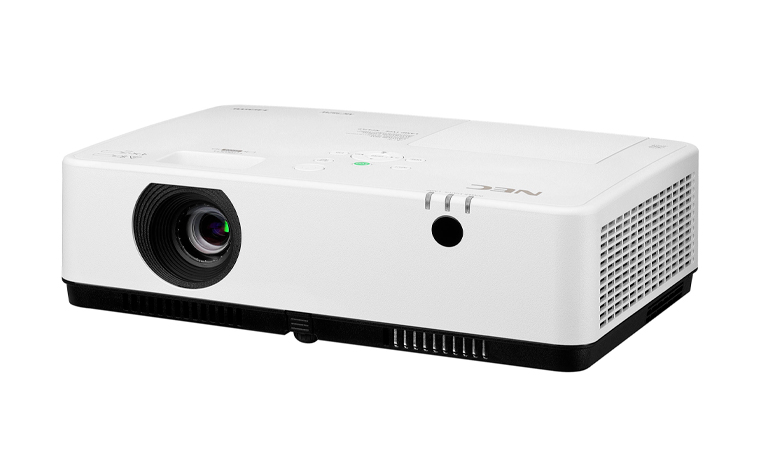
SHARP NEC NP-MC382W – Bright and Affordable Education Projector
The SHARP NEC NP-MC382W is a compact Education Projector with 3,800 lumens of brightness and WXGA (1280×800) resolution. Designed for classrooms, boardrooms, and retail spaces, it delivers clear, vibrant images in a variety of environments. Its portable size and feature-rich design make it a versatile choice for both schools and businesses.
Specs at a Glance
Price: $999
Resolution: WXGA (1280×800)
Brightness: 3,800 lumens
Technology: 3LCD
Lamp Life: 10,000 hours
Weight: 7.1 lbs
Speaker: Built-in 16W
Key Features
Handles 4K Signals – Even though it’s WXGA, the NP-MC382W can accept 4K input, ensuring compatibility with modern devices.
Wireless Collaboration – MultiPresenter software allows up to 16 users to share screens at once (with an optional wireless module).
Built-in Media Player – Play JPEG files directly from USB, perfect for quick slideshows and classroom visuals.
Strong Audio – A powerful 16W speaker is loud enough for most classrooms and small meeting spaces.
Affordable for Schools – Recognized with the Best in Classroom Price/Performance Award. Plus, SHARP NEC offers special education discounts through the Star Student Program.
Why Choose the NP-MC382W?
With bright output, reliable 3LCD performance, and excellent price-to-value, this projector is ideal for schools and organizations that need a cost-effective yet feature-rich solution. It may not be high-end, but it’s one of the best Education Projectors in its price range.
👉 Learn more about NEC Education Projectors and the Star Student Program for budget-friendly classroom solutions.
OPTOMA EH330UST
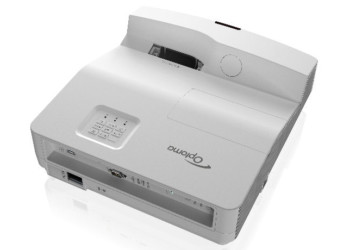
Optoma EH330UST – Bright Ultra-Short Throw Education Projector
The Optoma EH330UST is a 3,600-lumen Education Projector with Full HD 1080p resolution. Its ultra-short throw design allows it to create a 100-inch image from just a few inches away, making it ideal for classrooms, offices, and wall-mounted setups.
Specs at a Glance
Price: $1,599
Resolution: 1080p (1920×1080)
Brightness: 3,600 lumens
Technology: DLP
Lamp Life: 4,000 hours
Weight: 8.7 lbs
Key Features
Ultra-Short Throw Design – Perfect for classrooms where space is limited. Project a large screen without shadows or glare.
PC-Free Projection – Display JPEGs or Microsoft Office files (Word, Excel, PowerPoint) directly from a USB stick.
Cross-Platform Support – Works with Android, iOS, Mac, and Windows when paired with the optional HDCast Pro wireless module.
Network Control – Compatible with Crestron RoomView and PJLink, allowing IT teams to manage multiple projectors across schools or offices.
Why Choose the EH330UST?
The EH330UST delivers bright, sharp images and flexible installation options. With its ultra-short throw lens, PC-free playback, and strong networking features, it’s a smart choice for modern classrooms and business meeting spaces.
👉 Check out more Optoma Education Projectors for additional options that fit different room sizes and budgets.
Epson PRO EX10000
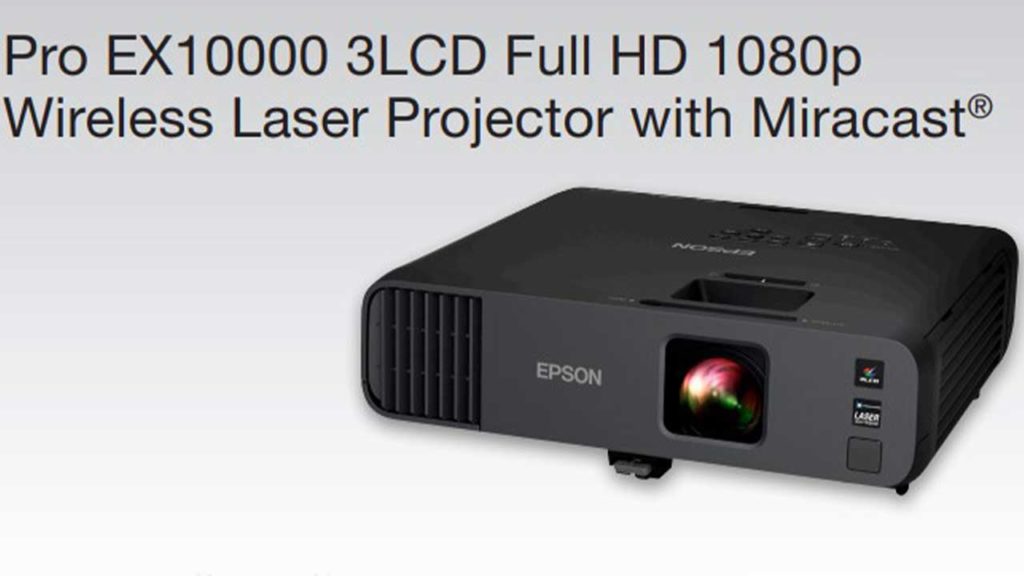
Epson Pro EX10000 – Bright Laser Education Projector for Classrooms and Business
The Epson Pro EX10000 is a 4,500-lumen Full HD 3LCD Education Projector built for classrooms and conference rooms. With its bright laser engine, wireless connectivity, and large-screen performance, it delivers vivid images even in spaces with lots of ambient light. You can project up to a 300-inch (25-foot) display, making it ideal for teaching, training, or collaborative work.
Specs at a Glance
Price: $1,299.99
Resolution: 1920×1080 (Full HD)
Brightness: 4,500 lumens
Contrast Ratio: 100,000:1
Laser Lifespan: 20,000 hours (up to 30,000 in extended mode)
Weight: 9 lbs
Built-in Audio: 16W speaker
Key Features
Laser Light Source – Delivers long-lasting, low-maintenance performance.
Wireless Connectivity – Supports Epson iProjection for Mac, Windows, Android, and Chromebooks.
Miracast Support – Mirror content wirelessly without extra cables.
Portability – Lightweight design with a soft carrying case for easy transport between classrooms or offices.
Versatile Use – Handles presentations, lessons, and even movies or games with sharp image quality.
Why Choose the Pro EX10000?
The Pro EX10000 is one of Epson’s most advanced business and education models. It combines strong brightness, wireless freedom, and easy setup in a portable design. Whether you need an Education Projector for classrooms, lecture halls, or multipurpose spaces, the Pro EX10000 is a reliable choice.
👉 Explore more options in Epson’s Education Projector lineup for different budgets and room sizes.
EPSON POWERLITE 725W
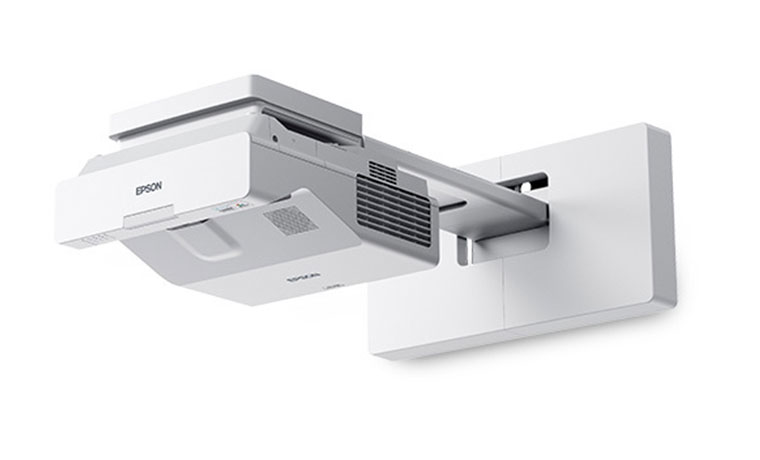
Epson PowerLite 725W – Bright Ultra-Short Throw Education Projector
The Epson PowerLite 725W is a WXGA (1280×800) 3LCD Education Projector designed for classrooms and meeting rooms. Thanks to its ultra-short-throw lens, it can project up to a 120-inch image from just inches away. This setup reduces shadows and offers 95% more interactive space than a standard 75″ flat panel, making it ideal for collaborative learning.
Specs at a Glance
Price: $1,890
Resolution: WXGA (1280×800)
Brightness: 4,000 lumens
Contrast Ratio: 2,500,000:1
Zoom: 1.0–1.35x digital
Light Source: Laser, up to 20,000 hours
Weight: 12.5 lbs
Audio: Built-in 16W mono speaker
Key Features
Bright 4,000 Lumens – Delivers clear, vibrant images even with the lights on.
Laser Light Source – Up to 20,000 hours of virtually maintenance-free performance.
Wireless Collaboration – Supports 5GHz Miracast, split-screen display from four devices, and Epson iProjection for up to 50 connected users.
Ultra-Short-Throw Design – Perfect for desks or wall mounts, reducing glare and shadows.
Why Choose the Epson PowerLite 725W?
The PowerLite 725W combines strong brightness, wireless features, and an ultra-short-throw lens at a budget-friendly price. It’s a versatile Education Projector that enhances collaboration in classrooms, training rooms, or small meeting spaces.
👉 Explore Epson’s full Education Projector lineup for more models that fit different room sizes and budgets.
BENQ EH600
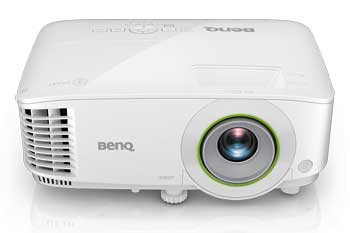
BenQ EH600 – Smart Android-Based Education Projector
The BenQ EH600 is the world’s first Android-based smart Education Projector, designed for classrooms and business use. It delivers Full HD (1920×1080) resolution with 3,500 lumens of brightness, ensuring sharp text and clear visuals for slides, spreadsheets, and documents. With SmartEco mode, the lamp lasts up to 15,000 hours, cutting energy costs and reducing maintenance.
Key Specs
Price: $999
Technology: DLP
Resolution: 1920×1080 (Full HD)
Brightness: 3,500 lumens
Contrast Ratio: 6,000:1
Zoom: 1.1:1
Lamp Life: 5,000 hours (15,000 in SmartEco)
Weight: 5.5 lbs
Audio: Built-in 2W speaker
Smart Features That Stand Out
Wireless Projection – Share JPEGs, PDFs, and documents directly from mobile devices or laptops without cables.
Built-in Apps – Use WPS Office to present Word, Excel, or PowerPoint files directly from a USB drive or internal storage.
Web Browsing – A built-in Firefox browser lets you display online content in real-time.
Why Choose the BenQ EH600?
Compact, bright, and intelligent, the BenQ EH600 is a versatile Education Projector for classrooms, training spaces, and offices. Its smart apps, wireless projection, and long lamp life make it an efficient choice for modern teaching and collaboration.
👉 Explore more in the BenQ Education Projector series to find models tailored for different room sizes and needs.
BENQ LU710
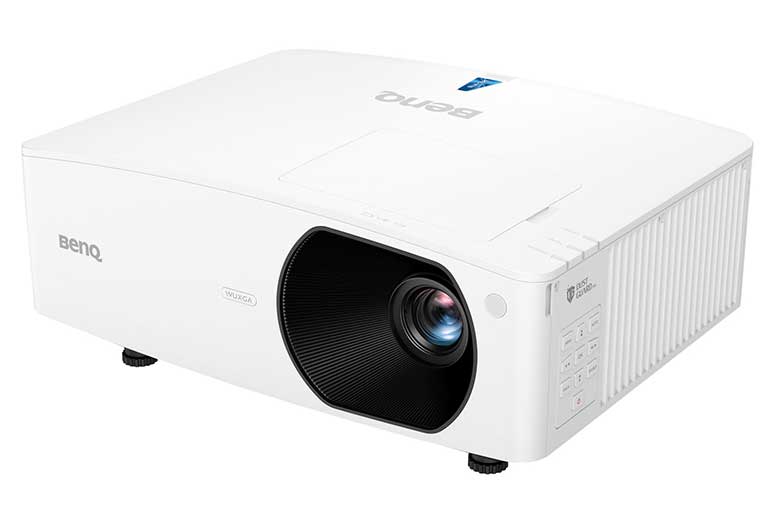
BenQ LU710 – High-Brightness Education Projector for Classrooms and Meeting Rooms
The BenQ LU710 is a WUXGA (1920×1200) DLP Education Projector designed for classrooms, conference rooms, and professional meeting spaces. With 4,000 lumens of brightness and a BlueCore laser light engine rated for up to 20,000 hours, it delivers sharp, clear images with minimal maintenance.
Key Specs
Price: $1,699
Technology: DLP
Resolution: 1920×1200 (WUXGA)
Brightness: 4,000 lumens
Contrast Ratio: 3,000,000:1
Zoom: 1.3x
Lamp Life: 20,000 hours
Weight: 13 lbs
Vivid Colors and Strong Performance
The dual color wheel covers 92% of Rec.709, ensuring vibrant and accurate colors for presentations. With a dynamic contrast ratio of 3,000,000:1, the LU710 produces visuals that remain sharp and engaging, even in bright rooms.
Smart Business and Education Tools
Wireless Presentations – Supports BenQ InstaShow, allowing multiple presenters to share content smoothly.
Easy Casting – The QCast Mirror Wi-Fi dongle ($59) enables wireless casting from most devices without extra drivers or apps.
Flexible Setup – With 2D keystone correction (±30°) and Auto Keystone, installation is quick and hassle-free.
Why Choose the BenQ LU710?
With its bright laser light source, long lifespan, and network management features, the BenQ LU710 Education Projector is a reliable choice for schools, training centers, and professional offices. It combines high brightness, vivid color, and easy collaboration tools in a durable, low-maintenance package.
👉 Learn more about the full BenQ Education Projector lineup to compare models designed for different room sizes and teaching needs.
Epson EpiqVision Flex CO-W01
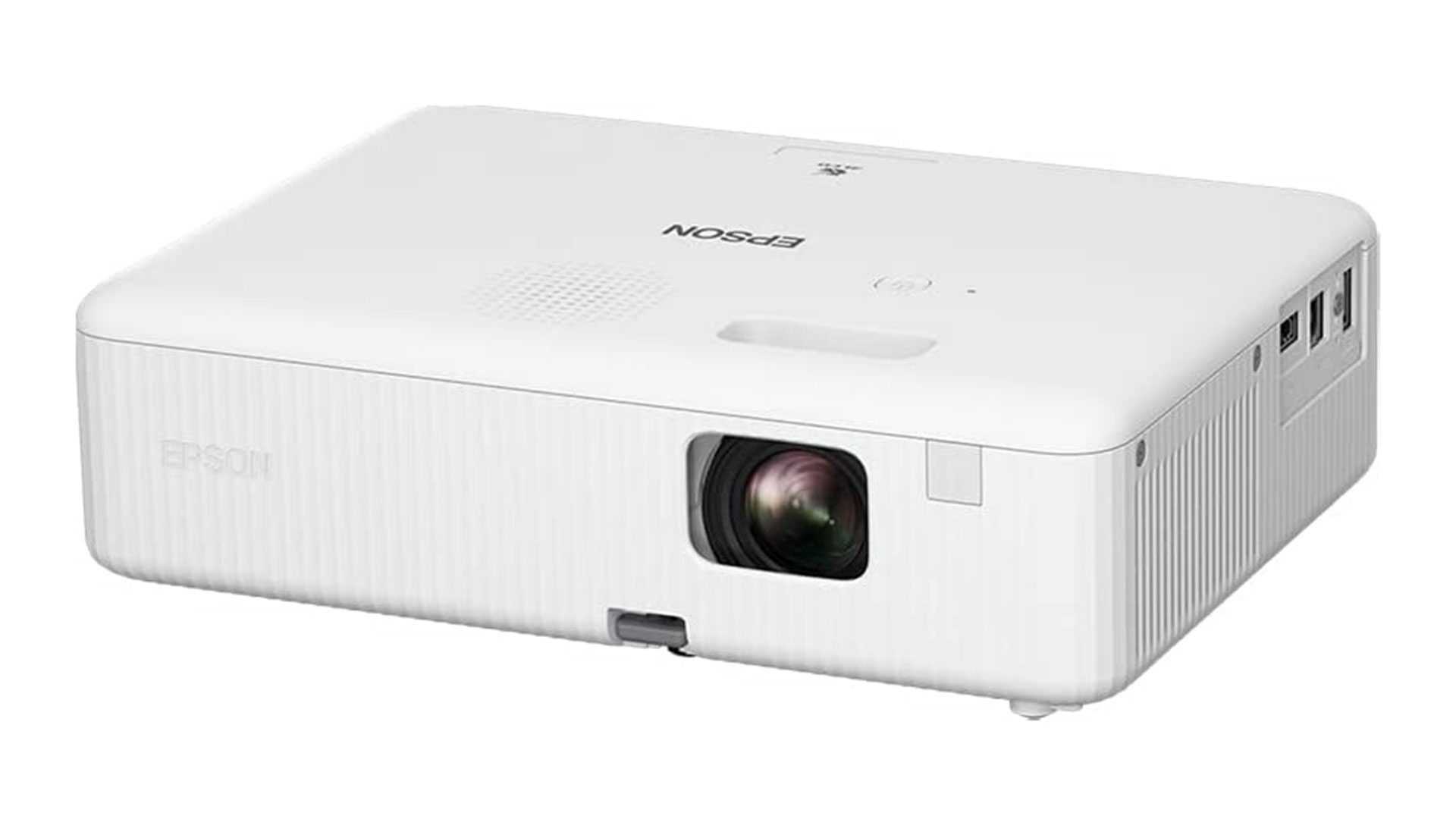
Epson EpiqVision Flex CO-W01 – Portable Education Projector for Work and Entertainment
The Epson EpiqVision Flex CO-W01 is a versatile 3LCD Education Projector built for both classrooms and casual use. As Epson’s Product Manager Kenny Tang describes, it works just as well for daytime presentations as it does for movie nights with friends. With bright, colorful images, it fits perfectly in hybrid learning or work environments.
Key Specs
Price: $429
Technology: 3LCD
Resolution: WXGA (1280×800)
Brightness: 1,000 ANSI lumens (white) / 3,000 ISO lumens (color)
Zoom: 1.35x manual
Lamp Life: 6,000 hours (12,000 ECO)
Weight: 5.3 lbs
Flexible Setup and Large Screen Size
The CO-W01 projects images up to 300 inches, with 100 inches already delivering excellent clarity. With vertical and horizontal keystone correction, plus zoom and manual focus, setup is quick and easy in classrooms, offices, or living rooms.
Bright and Vivid Colors
Unlike many DLP models, Epson’s 3LCD technology delivers equal color and white brightness. Colors stay vibrant and accurate even with some ambient light. Epson also measures brightness using ISO lumens, which ensures reliable brightness ratings for real-world performance.
Why Choose the CO-W01?
Affordable, compact, and portable, this Education Projector suits teachers, students, and professionals alike. It delivers sharp presentations by day and immersive entertainment by night, making it one of the most flexible options in Epson’s lineup.
👉 Check Epson’s official Education Projector page to explore more models designed for classrooms and hybrid learning.
Epson PowerLite L265F 1080p 3LCD
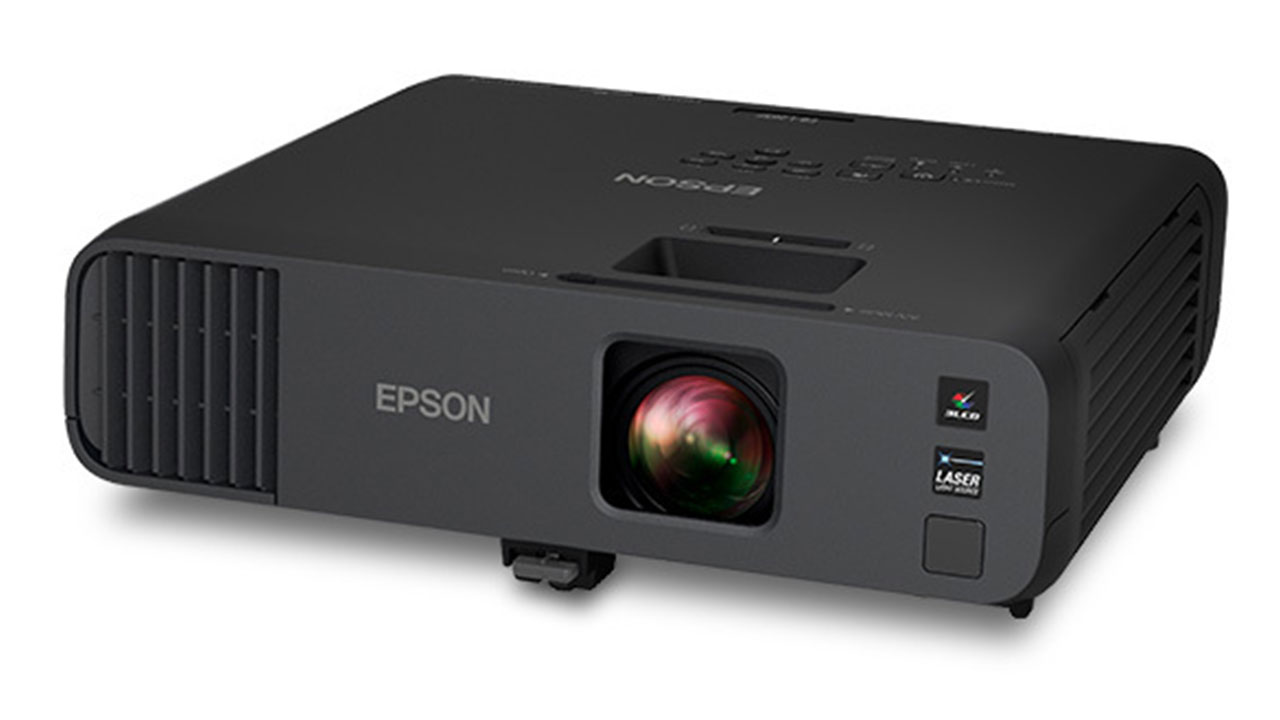
Epson PowerLite L265F – Bright Education Projector for Classrooms and Meetings
Epson’s 2023 EpiqVision and PowerLite series bring large, interactive displays to classrooms, meeting rooms, and promotional spaces. As Epson’s senior product manager Remi Del Mar notes, today’s displays must be “large and wide enough for better in-person and remote engagement.” The PowerLite L265F is built exactly for that purpose.
Key Specs
Price: $1,535
Technology: 3-chip 3LCD
Resolution: Full HD (1920×1080)
Brightness: 4,600 ANSI lumens
Contrast: 2,500,000:1 (Dynamic)
Zoom: 1.6x optical
Lamp Life: 20,000 hours (Normal) / 30,000 hours (ECO)
Weight: 9.5 lbs
Large and Bright Displays
The L265F projects images up to 310 inches diagonal, which is 16 times larger than a 75-inch flat panel. With 4,600 lumens of brightness and a dynamic contrast ratio of 2,500,000:1, it ensures clear, vivid visuals even in well-lit classrooms or meeting spaces.
Reliable Laser Light Source
Its laser light engine offers up to 30,000 hours in ECO mode, making it a low-maintenance and cost-effective choice. This design allows schools and businesses to rely on consistent performance without frequent lamp replacements.
Color Accuracy and Value
Epson uses its proven 3-chip 3LCD technology, delivering equal color and white brightness for natural, accurate images. By choosing Full HD instead of higher-cost resolutions, Epson balances affordability with high-quality visuals, making the L265F a smart investment for education and business.
Why Choose the L265F?
With its large screen size, strong brightness, and low-maintenance design, the PowerLite L265F is a flexible Education Projector that works well in classrooms, conference rooms, and collaborative spaces.
👉 Learn more about Epson’s Education Projectors and explore other models built for schools and hybrid workspaces.
Epson PowerLite L570U 3LCD
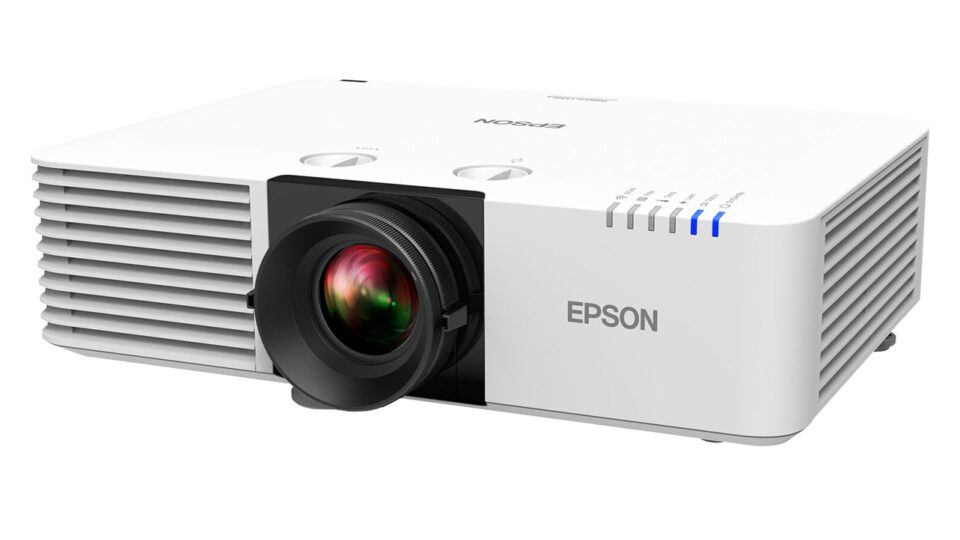
Epson PowerLite L570U – Bright and Versatile Education Projector
The Epson PowerLite L570U is a medium-sized, portable Education Projector that weighs only 18.7 lbs, making it easy for one person to set up. Priced at $3,149, it delivers 5,200 lumens of brightness and supports screen sizes up to 500 inches. This makes it an excellent choice for classrooms, conference rooms, churches, and even art installations.
Key Specs
Technology: 3LCD
Resolution: WUXGA (1920×1200)
Brightness: 5,200 ANSI lumens
Contrast: 2,500,000:1 (Dynamic)
Zoom: 1.6x
Lens Shift: Vertical ±30°, Horizontal ±30°
Lamp Life: 20,000 hours (Normal mode)
Weight: 18.7 lbs
Enhanced 4K Experience
The L570U features 4K Enhancement technology, a pixel-shifting system that sharpens images beyond standard 2K projection. It accepts 4K@60P signals, shifting each pixel diagonally to reproduce fine details. While not true 4K, this feature makes text, CAD drawings, and scientific visuals much clearer compared to standard 1080p projectors.
Flexible Aspect Ratios for Modern Needs
In addition to standard widescreen, the projector supports 16:6 and 21:9 aspect ratios. The ultrawide 21:9 format improves video conferencing by offering a broader field of view, making meetings more immersive and allowing users to see more content on-screen.
Why Choose the L570U?
With its high brightness, large screen capability, and enhanced resolution, the PowerLite L570U is an ideal Education Projector for professional, educational, and creative spaces. It balances performance and portability while offering advanced features usually found in higher-priced models.
👉 Learn more about Epson’s Education Projectors and discover other models in the Epson PowerLite series for schools and businesses.
SONY VPL-PHZ61 WUXGA 3LCD
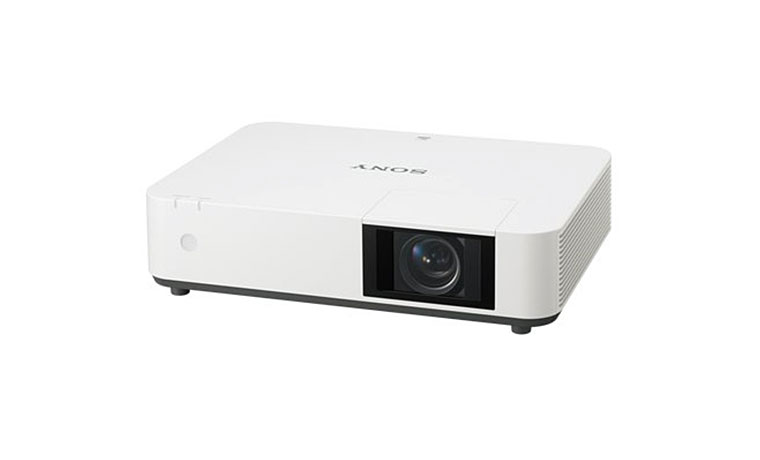
Sony VPL-PHZ61 – Bright and Reliable Education Projector
The Sony VPL-PHZ61 is a powerful Education Projector that uses 3LCD technology, delivering equal color and white brightness. Unlike 1-chip DLP projectors, it avoids reduced color output and eliminates the “rainbow effect” that some viewers notice.
Key Specs
Price: $3,437.50 MSRP
Technology: 3LCD
Resolution: WUXGA (1920×1200)
Brightness: 6,400 ANSI lumens
Contrast: Infinity:1
Zoom: 1.6:1
Lens Shift: Horizontal ±15%, Vertical -35% to +55%
Lamp Life: Not listed
Weight: 15 lbs (7 kg)
Performance and Features
The VPL-PHZ61 uses Sony’s Z-Phosphor laser light source, offering quick startup and shutdown with long-term reliability. Compared to last year’s model, brightness has increased from 6,000 to 6,400 lumens, making it suitable for classrooms, meeting rooms, and professional installations.
For added installation flexibility, Sony’s larger FHZ series supports interchangeable lenses and brightness levels ranging from 6,000 to 13,000 lumens.
This model also includes Intelligence Settings 3.0, which adjusts projector performance automatically based on environment and usage. You can select optimized modes for Classroom, Meeting Room, Museum, Entertainment, or Multi-screen setups.
Why Choose the VPL-PHZ61?
The Sony VPL-PHZ61 combines brightness, reliability, and flexibility, making it an excellent Education Projector for schools, businesses, and creative spaces. Its advanced features ensure stable performance and sharp visuals across a wide range of environments.
👉 Learn more about Sony’s Education Projectors and explore the full PHZ series for different brightness and installation needs.
BenQ LK936ST 4K Golf Simulation and Home Entertainment Projector
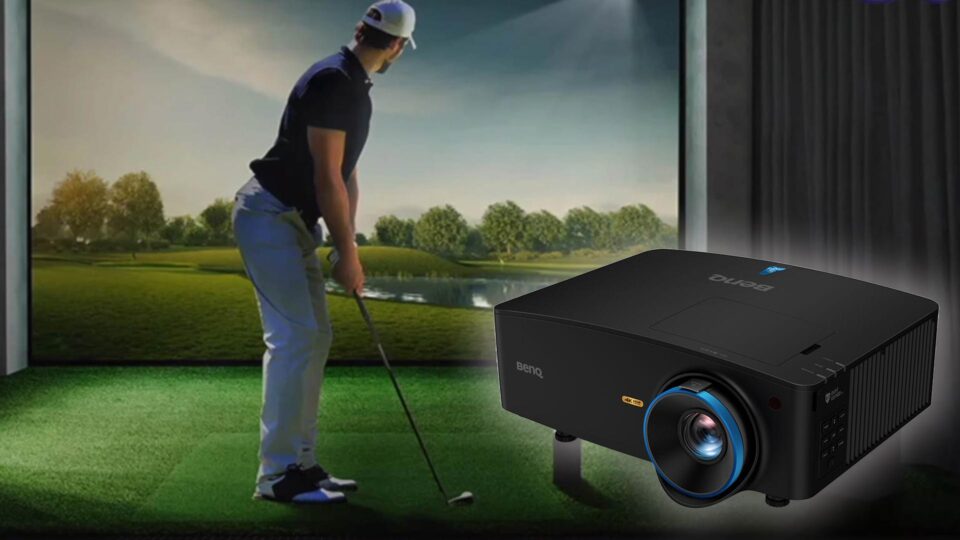
BenQ LK936ST – 4K Laser Short-Throw Education Projector for Simulators and Home Use
The BenQ LK936ST is a powerful Education Projector that also shines in golf simulators and home theaters. With 4K HDR support, 5,100 lumens of brightness, and a dynamic contrast ratio of 3,000,000:1, it delivers sharp, vibrant visuals even in well-lit rooms.
Key Specs
Price: $4,899 MSRP
Technology: Laser DLP
Resolution: Full HD (1920×1080, enhanced for 4K HDR)
Brightness: 5,100 ANSI lumens
Contrast: 3,000,000:1
Zoom: 1.1x
Lens Shift: Horizontal -23% to +23%, Vertical -60% to +60%
Lamp Life: 20,000 hours
Weight: 15 lbs (7 kg)
Why It Stands Out
Indoor golf is booming, with the global simulator market projected to grow from $1.3 billion in 2021 to $3.4 billion by 2030. The LK936ST supports this trend by delivering a bright, short-throw solution perfect for compact simulator setups. At the same time, its 4K HDR performance and laser light source make it an excellent choice for education, business presentations, and high-end home theater use.
Designed for Flexibility
BenQ has led the professional golf simulator market for over a decade, and the LK936ST continues that tradition. Its short-throw design, high resolution, and long-lasting 20,000-hour laser engine ensure minimal maintenance and maximum performance. Beyond simulators, it works equally well as an Education Projector, handling classroom lessons, lecture halls, and collaborative spaces with ease.
Final Take
The BenQ LK936ST is more than a projector—it’s a versatile solution for education, entertainment, and simulation. Whether you’re setting up a golf simulator, a classroom, or a home theater, this model combines brightness, clarity, and reliability in one compact package.
👉 Learn more about BenQ Education Projectors and explore how the LK936ST fits into both professional and home environments.
Optoma ML1080 Portable RGB Laser Projector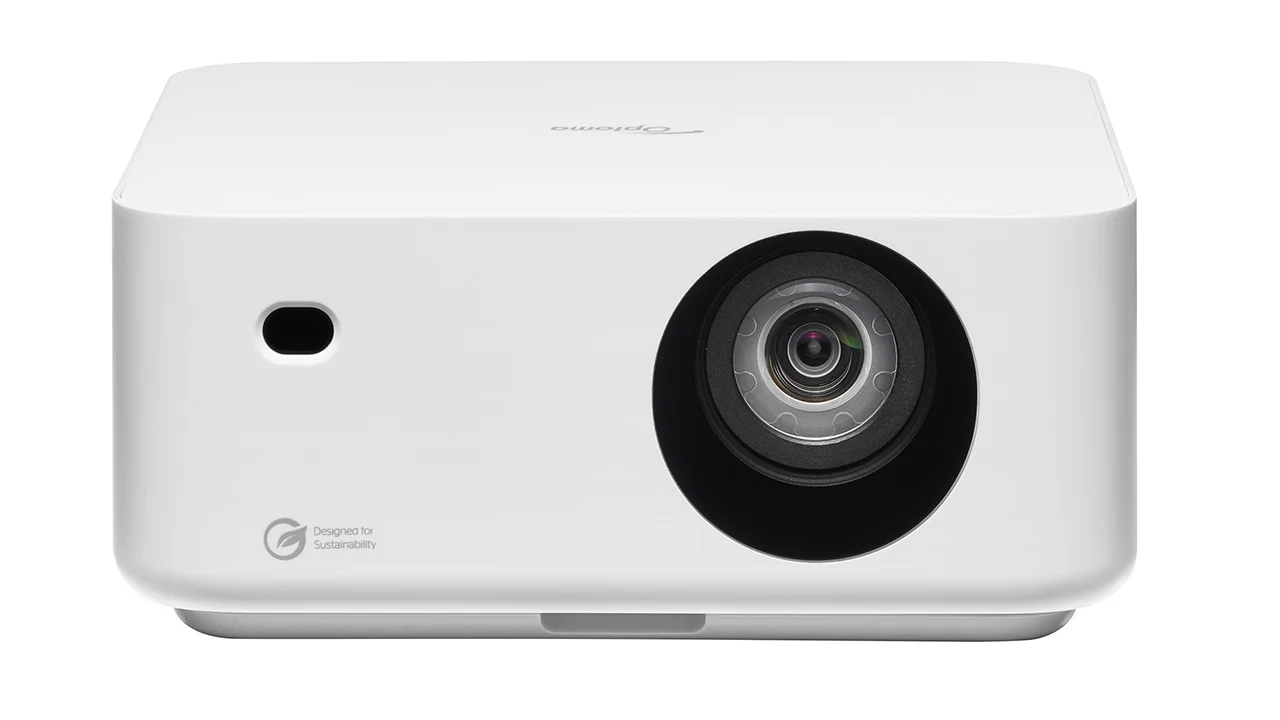
Optoma ML1080 – Ultra-Compact RGB Laser Education Projector
The Optoma ML1080 is a premium Education Projector that combines portability with powerful performance. This ultra-compact 1080p RGB laser model weighs just 2.2 lbs, making it one of the lightest RGB laser projectors available today. Priced at $999, it’s built for classrooms, business use, and travel, while still delivering outstanding picture quality.
Key Specs
Price: $999.99 MSRP
Technology: DLP (0.23″ DMD)
Resolution: 1920×1080 (Full HD)
Brightness: 1,200 ANSI lumens
Contrast: 3,000,000:1
Zoom: Fixed
Lens Shift: No
Lamp Life: 30,000 hours
Weight: 2.2 lbs (0.9 kg)
What Makes It Special
Unlike most compact projectors that rely on LED, the ML1080 uses an RGB triple laser light source. This design delivers more vibrant colors, higher contrast, and reliable brightness. With its lightweight body, you can easily carry it between classrooms, offices, or even while traveling.
For added flexibility, Optoma also offers the ML1080ST short-throw version at $1,149. This model allows you to project a large image from an even shorter distance, perfect for small classrooms or meeting rooms.
Versatile for Education and Beyond
The Optoma ML1080 is more than just a portable projector. Its color accuracy and contrast make it a strong fit for education, presentations, and creative work. At the same time, it doubles as a premium option for home entertainment, offering sharper visuals than many competing portable 4K models.
Final Take
If you need a bright, compact, and versatile Education Projector, the Optoma ML1080 is one of the best choices in its class. Its long-lasting laser light source and portability make it a smart investment for both schools and professionals.
👉 Learn more about Optoma Education Projectors and explore the ML1080 as a portable solution for teaching, presenting, or traveling.
Epson PowerLite L265F 1080p 3LCD Laser Business Projector
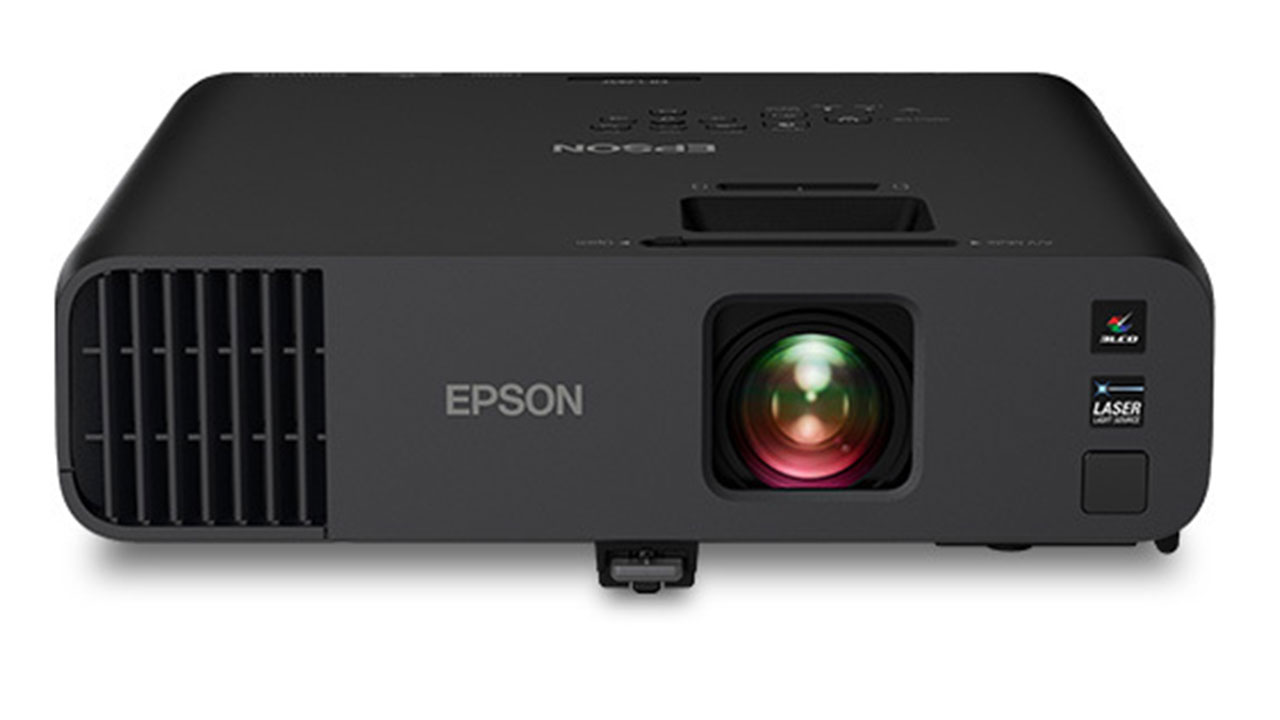
Epson PowerLite L265F – Bright, Versatile Education Projector
The Epson PowerLite L265F is a powerful Education Projector designed for classrooms, boardrooms, galleries, and digital signage. Priced at $1,535, it combines compact design, bright output, and flexible features to deliver engaging visuals in professional and educational environments.
Key Specs
Price: $1,535 MSRP
Technology: 3-chip 3LCD
Resolution: 1920 × 1080 (Full HD)
Brightness: 4,600 ANSI lumens
Contrast: 2,500,000:1 (Dynamic)
Zoom Lens: 1.6x optical
Lens Shift: No
Lamp Life: 20,000 hours
Weight: 9.5 lbs (4.2 kg)
Bright, Wide, and Flexible
The L265F projects images up to 310 inches diagonally, making it 16 times larger than a standard 75-inch flat panel. With 4,600 lumens of brightness and a solid-state laser light source, it delivers vivid colors and sharp details even in rooms with high ambient light. The projector can be mounted at almost any angle, giving schools and businesses flexibility for different setups.
Designed for Collaboration and Creativity
Wireless connectivity allows seamless content sharing from multiple devices. With Epson’s Projector Content Manager software, you can easily create and manage dynamic digital signage for events, education, or promotions. This makes the L265F not just a teaching tool but also a creative display solution.
Launched in June 2023, the PowerLite L265F is part of Epson’s EpiqVision and PowerLite series, designed to transform classrooms, meeting rooms, and promotional spaces. As Remi Del Mar, Epson’s Senior Product Manager, explains:
“Today’s displays need to be large and wide enough to accommodate all aspects of viewing, sharing, and interactivity for better in-person and remote participant engagement.”
Final Take
The Epson PowerLite L265F is a versatile and reliable Education Projector that blends brightness, large-scale display capability, and smart features. Whether for teaching, presenting, or signage, it ensures an engaging visual experience.
👉 Learn more about Epson Education Projectors and discover how the PowerLite L265F can enhance collaboration and creativity.
Epson EpiqVision Flex CO-W01 Portable Projector
Epson EpiqVision Flex CO-W01 – Portable Education Projector for Work and Play
The Epson EpiqVision Flex CO-W01 is a versatile Education Projector priced at $429, designed for hybrid professionals, classrooms, and home users. It blends portability, bright images, and simple setup, making it a smart choice for both learning and entertainment.
Key Specs
Price: $429
Technology: 3LCD
Native Resolution: WXGA (1280 × 800)
Brightness: 1,000 ANSI lumens
Zoom Lens: 1.35x
Lens Shift: N/A
Lamp Life: 6,000 hours (12,000 ECO)
Weight: 5.3 lbs
Big Screen Anywhere
The CO-W01 supports Full HD content and projects images up to 300 inches, with crisp performance at 100 inches in most rooms. Thanks to vertical and horizontal keystone correction, plus manual zoom and focus, it’s easy to set up on a desk, in a classroom, or in a living room.
Built for Hybrid Lifestyles
Epson designed the CO-W01 for both work and play. During the day, it delivers bright, sharp visuals for lessons, training, or presentations. At night, it transforms into a home theater, providing immersive experiences for movies, sports, or games. This balance makes it an affordable Education Projector that adapts to different environments.
Final Take
Portable, budget-friendly, and flexible, the Epson EpiqVision Flex CO-W01 is more than just a classroom projector. It’s a reliable companion for hybrid workers, students, and families who want professional-quality projection with home entertainment value.
👉 Explore more about Epson Education Projectors and see how the EpiqVision Flex CO-W01 can enhance both learning and entertainment.
Epson PowerLite L570U 3LCD Laser Business Projector
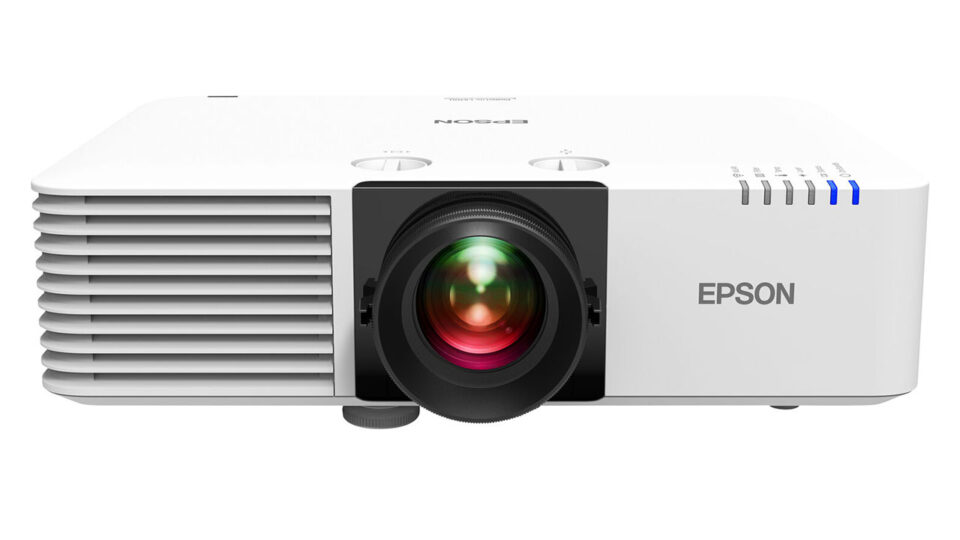
Epson PowerLite L570U – Bright and Versatile Education Projector
The Epson PowerLite L570U is a professional-grade Education Projector designed for medium to large spaces. Priced at $3,139, it combines high brightness, advanced setup features, and long-lasting laser performance.
Key Specs
Price: $3,139
Technology: 3LCD
Native Resolution: WUXGA (1920 × 1200)
Brightness: 5,200 ANSI lumens
Contrast: 2,500,000:1 (Dynamic)
Zoom Lens: 1.6x
Lens Shift: Vertical ±30°, Horizontal ±30°
Lamp Life: 20,000 hours
Weight: 18.7 lbs
4K Enhanced Visuals
The L570U includes Epson’s 4K Enhancement technology, which sharpens WUXGA images for smoother detail and improved clarity. It also supports HDR content, ensuring vibrant colors and deep contrast in any environment.
Flexible Installation
With horizontal and vertical lens shift, 1.6x optical zoom, edge blending, and geometric correction, the L570U makes installation easy. It can project up to a 500-inch image, perfect for lecture halls, large classrooms, conference spaces, or even creative art installations.
Performance and Portability
At under 19 lbs, the projector is light enough for one person to move and set up. Compared to higher-lumen L-series models like the L730U, the L570U offers a more budget-friendly price while still delivering outstanding performance for education, business, or home theater use.
Final Take
Bright, versatile, and low-maintenance, the Epson PowerLite L570U is a strong choice for schools, universities, and organizations that need a powerful Education Projector.
👉 Learn more about Epson Education Projectors and see how the L570U can enhance classrooms and professional spaces.
SONY VPL-PHZ61 WUXGA 3LCD Business Projector
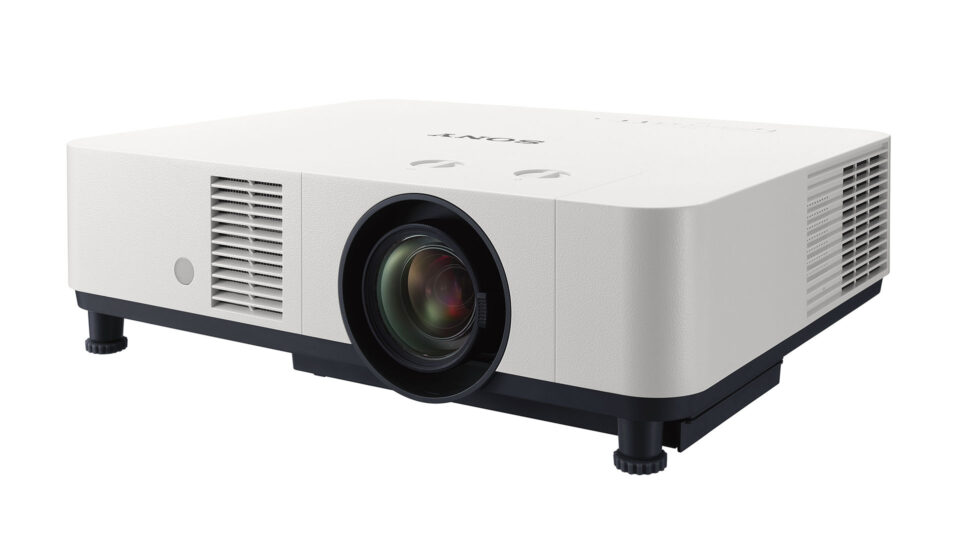
Sony VPL-PHZ61 – Bright and Compact Education Projector
The Sony VPL-PHZ61 is a compact Education Projector built for classrooms, lecture halls, and conference spaces. Priced at $3,437.50, it delivers 6,400 ANSI lumens of brightness and WUXGA (1920 × 1200) resolution, making it a strong choice for professional and educational environments.
Key Specs
Price: $3,437.50
Technology: 3LCD
Resolution: WUXGA (1920 × 1200)
Brightness: 6,400 ANSI lumens
Contrast: Infinity:1
Zoom Lens Ratio: 1.6:1
Lens Shift: H: ±15%, V: -35% to +55%
Lamp Life: Not listed
Weight: 15 lbs
Reliable Brightness and Clarity
The VPL-PHZ61 builds on Sony’s proven 3LCD design, avoiding rainbow artifacts and delivering equal color and white brightness. Its high lumen output ensures clear images even in well-lit rooms, perfect for large classrooms and conference halls.
Smart Evolution
Sony takes an incremental approach to its professional lineup. The PHZ61 improves on earlier models like the VPL-PHZ50 and PHZ60 with higher brightness and added convenience features, while maintaining the reliability and performance that educators and professionals trust.
Versatile Applications
With flexible lens shift, a compact body, and strong brightness, this projector adapts to many settings—from lecture halls and boardrooms to entertainment venues and e-sports events. Its durability and consistent image quality make it ideal for long-term use.
Final Take
The Sony VPL-PHZ61 is a dependable, bright, and versatile Education Projector for schools, businesses, and professional spaces.
👉 Learn more about Sony Education Projectors and explore how the VPL-PHZ61 can transform your learning or meeting environment.
Panasonic PT-FRQ50 4K DLP Business/Education Laser Projector
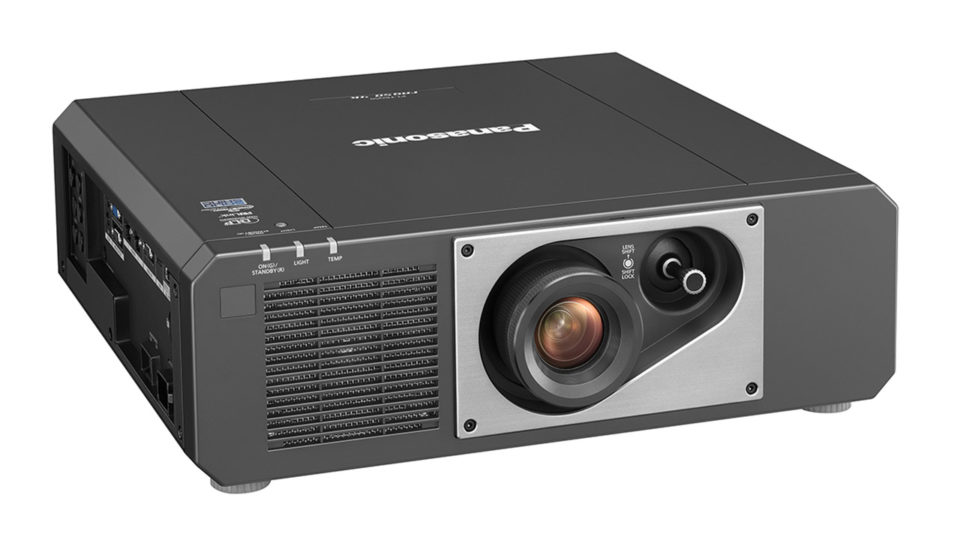
Panasonic PT-FRQ50 – Bright 4K Education Projector for Professional Use
The Panasonic PT-FRQ50 is a professional-grade Education Projector designed for classrooms, lecture halls, and business installations. Priced at $4,999, it delivers 5,200 lumens of brightness and sharp 4K visuals through pixel-shifting technology. Available in both black and white, this model combines reliability with installation flexibility.
Key Specs
Price: $4,999 MSRP
Technology: DLP with XPR (Single-Chip DMD)
Resolution: 1920 × 1080 ×4 (4K via pixel-shifting)
Brightness: 5,200 lumens
Contrast: 20,000:1
Zoom Lens Ratio: 2.0x
Lens Shift: Yes
Lamp Life: 20,000 hours (laser/phosphor)
Weight: 35.5 lbs
Bright and Reliable Performance
The PT-FRQ50 features a 20,000-hour laser/phosphor light engine, ensuring long-term use with minimal maintenance. Its 2.0x manual zoom, manual focus, and extensive lens shift make installation simple in classrooms, auditoriums, and business environments.
Modern Connectivity
With HDMI 2.0 and DIGITAL LINK (HDBaseT), the projector integrates seamlessly into modern AV setups, making it a versatile solution for schools and professional venues.
Versatile Applications
The PT-FRQ50 delivers smooth 4K projection with vibrant colors and sharp detail. Its combination of brightness, flexibility, and durability makes it ideal for education, corporate presentations, and creative installations.
Final Take
The Panasonic PT-FRQ50 stands out as a bright, flexible, and low-maintenance Education Projector, perfect for institutions and organizations that need professional-quality projection.
👉 Learn more at Panasonic Education Projectors.
LG ProBeam BU53PST 4K Laser Projector
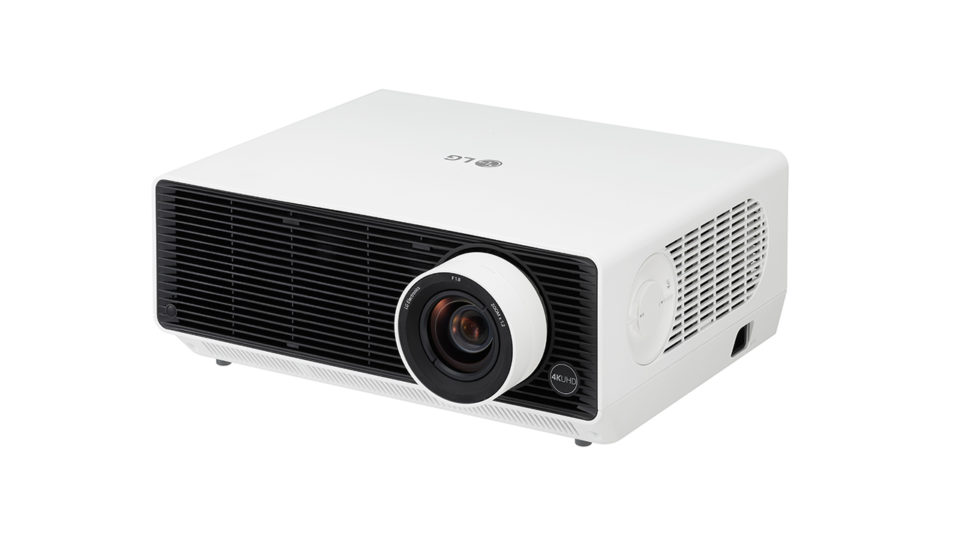
LG ProBeam BU53PST – Bright 4K Short-Throw Education Projector
The LG ProBeam BU53PST is a compact Education Projector that combines a 4K UHD DLP engine with a multi-channel laser light source. Priced at $4,299, it delivers 5,000 ANSI lumens and a 3,000,000:1 contrast ratio, ensuring sharp, vibrant images in both professional and learning environments.
Key Specs
Price: $4,299 MSRP
Technology: DLP Laser
Resolution: 1920 × 1080 ×4 (4K UHD via pixel-shifting)
Brightness: 5,000 ANSI lumens
Contrast: 3,000,000:1
Zoom Lens Ratio: 1.2x
Lens Shift: Yes
Lamp Life: 20,000 hours (Normal mode)
Weight: 21.4 lbs / 9.7 kg
Bright and Flexible Performance
The BU53PST projects detailed 4K images with impressive clarity, making it ideal for classrooms, training simulators, and digital signage. Its laser light engine runs up to 20,000 hours, offering years of reliable use with minimal maintenance.
Smart Installation Features
With 1.2x optical zoom and lens shift, installation is straightforward in different room sizes and layouts. The short-throw design allows large images from closer distances, reducing shadows and glare in classrooms or meeting spaces.
Connectivity and Applications
Built-in wireless support makes it easy to share content across devices. Whether used for education, corporate presentations, digital signage, or home entertainment, this projector adapts to a wide range of needs.
Final Take
The LG ProBeam BU53PST stands out as a versatile Education Projector that blends brightness, flexibility, and long-lasting performance. It’s an excellent choice for schools, businesses, and creative spaces looking for a reliable 4K display solution.
Epson PowerLite L730U 7000 Lumen 3LCD Laser Projector
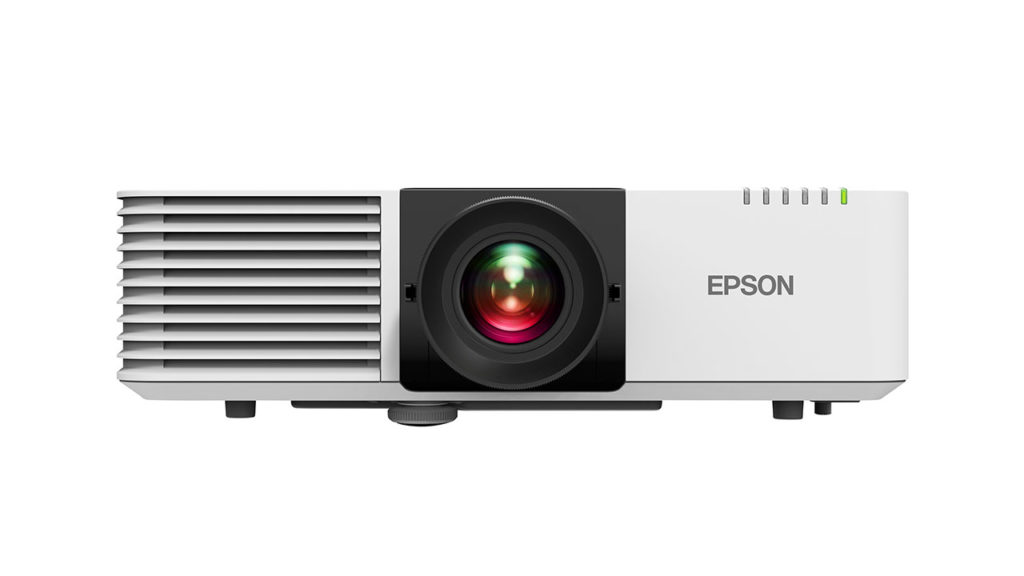
Epson PowerLite L730U – Bright and Reliable Education Projector
The Epson PowerLite L730U is a compact and powerful Education Projector designed for classrooms, lecture halls, and large venues. Priced at $4,181 MSRP, it delivers 7,000 ANSI lumens of brightness with WUXGA (1920 × 1200) resolution, producing sharp and vibrant images even in well-lit rooms.
Key Specs
Price: $4,181 MSRP
Technology: 3LCD laser
Resolution: WUXGA (1920 × 1200)
Brightness: 7,000 ANSI lumens
Contrast: 2,500,000:1 (Dynamic)
Zoom Lens Ratio: 1 – 1.6x optical
Lens Shift: Yes
Lamp Life: 20,000 hours (Normal)
Weight: 18.5 lbs
Performance and Flexibility
With three native 1920 × 1200 RGB LCD chips, the L730U delivers bright, detailed, and color-accurate images. Its high brightness ensures visibility in large classrooms, conference halls, or auditoriums, while the wide zoom range and lens shift make installation flexible.
Smart Design
The L730U comes in two cabinet options (black or white) to match different environments. As part of Epson’s 2022 L-Series, it integrates seamlessly into existing setups and offers consistent performance across educational and business spaces.
Applications
From classrooms and lecture halls to large meeting rooms and signage, the L730U provides reliable projection for professional and educational needs. Its 20,000-hour laser light source ensures years of low-maintenance use, making it a smart long-term investment.
Final Take
The Epson PowerLite L730U stands out as a bright, flexible, and durable Education Projector. With excellent resolution, high brightness, and long lamp life, it’s an ideal choice for schools, businesses, and large venues seeking professional-grade projection.
👉 Learn more at Epson Education Projectors.
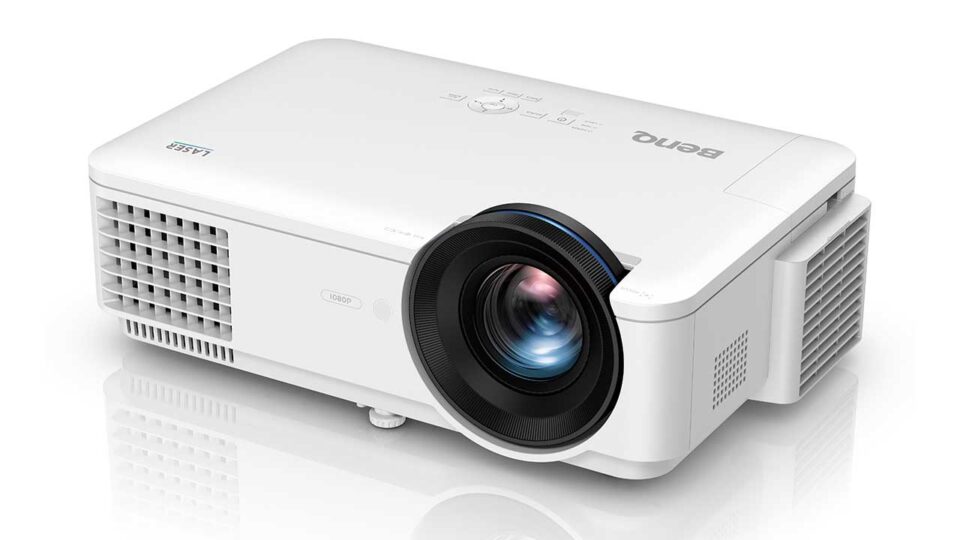
BenQ LH820ST – Short-Throw Laser Education Projector
The BenQ LH820ST is a professional short-throw Education Projector designed for golf simulators, classrooms, and multipurpose spaces. With Full HD (1920 × 1080) resolution, 3,600 ANSI lumens, and a 3,000,000:1 dynamic contrast ratio, it delivers sharp, bright, and colorful images in almost any environment.
Key Specs
Price: $1,899 MSRP
Technology: DLP (0.47″ DMD)
Resolution: 1920 × 1080 (Full HD)
Brightness: 3,600 ANSI lumens
Contrast: 3,000,000:1
Zoom Lens: Fixed
Lens Shift: No
Lamp Life: 20,000 hours
Weight: 12.3 lbs (5.6 kg)
Performance and Features
Covering 90% of the Rec.709 color space, the LH820ST produces accurate, vivid colors ideal for teaching, simulation, and presentations. Its 16.7 ms high-speed HDMI input ensures smooth playback, making it suitable not only for golf simulators but also for fast-paced educational content and entertainment.
Screen Fill Technology
BenQ’s Screen Fill technology automatically adjusts resolution for a perfect full-screen image, reducing distortion and simplifying setup. This feature allows teachers, students, or simulator users to focus on content instead of manual adjustments.
Applications
With a 20,000-hour laser light source and compact short-throw design, the LH820ST works well in classrooms, training facilities, and immersive setups like simulators. It’s also a reliable choice for schools and businesses looking for a long-lasting, low-maintenance Education Projector.
Final Take
The BenQ LH820ST combines brightness, accurate color, and easy setup in a flexible package. Whether for education, business, or interactive environments, it’s a smart investment for those needing a high-quality, durable projector.
👉 Learn more at BenQ Education Projectors.
Education and Business Projector Buyer’s Guide: High End / Specialty Projectors
The High-End and Specialty Projectors category features ultra-bright projectors perfect for museums, large auditoriums, lecture halls, and mega-churches. They’re also great for specialty signage and creative setups, offering advanced features like edge blending and projection mapping.
EPSON PRO L1755UNL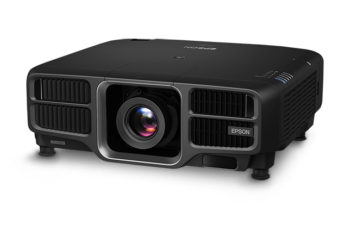
Epson Pro L1755UNL – Large-Venue Education Projector with 15,000 Lumens
The Epson Pro L1755UNL is a powerhouse Education Projector designed for large venues such as concert halls, museums, auditoriums, and digital signage installations. With 15,000 lumens of brightness, WUXGA resolution, and 4K pixel-shifting support, it delivers sharp, vivid, and professional-grade visuals even on massive screens.
Key Specs
Price: $33,000
Technology: 3LCD laser
Resolution: 1920 × 1200 (WUXGA)
Brightness: 15,000 lumens
Contrast Ratio: 2,500,000:1
Lens Options: Interchangeable zoom lenses
Lens Shift: Yes
Lamp Life: 20,000 hours
Weight: 52.2 lbs
Performance and Features
This projector uses a dual blue laser system. One laser generates red and yellow via phosphor wheels, while the other produces blue, ensuring accurate, vibrant colors. With 4K pixel-shifting technology, it accepts 4K content and enhances detail beyond standard WUXGA projectors.
Advanced Installation Flexibility
The Pro L1755UNL supports edge blending for multi-projector setups and projection mapping for irregular surfaces, making it ideal for immersive and creative installations. Multiple interchangeable lens options allow flexible placement, while both black and white cabinet finishes ensure it blends seamlessly into any environment.
Applications
From education auditoriums to large-scale professional events, the L1755UNL delivers unmatched clarity and brightness. Its 20,000-hour laser light source reduces maintenance, providing a reliable and long-lasting solution for institutions and enterprises.
Final Take
If you need a large-venue Education Projector that combines high brightness, flexible installation, and 4K support, the Epson Pro L1755UNL is one of the best in its class.
👉 Learn more at Epson Education Projectors.
SHARP NEC PX1005QL
SHARP NEC NP-PX1005QL – Native 4K Education Projector for Large Venues
The SHARP NEC NP-PX1005QL is a premium Education Projector built for large venues where image clarity and detail matter most. Winner of our Best in Class Performance Award in 2021, it delivers native 4K resolution—not pixel-shifted—ensuring razor-sharp visuals for video, photography, digital art, and high-resolution content.
Key Specs
Price: $24,000
Technology: DLP Laser
Resolution: WQXGA 3840 × 2160 (Native 4K)
Brightness: 10,000 lumens (measured at 10,055)
Laser Life: 20,000 hours
Weight: 63.9 lbs
Performance
With true 4K detail, the NP-PX1005QL outperforms pixel-shifting 3LCD projectors in its price range. Its 10,000 lumens of brightness and rich color output make it ideal for higher education, corporate venues, and houses of worship. The laser engine lasts up to 20,000 hours—roughly 18 years at 30 hours per week—offering long-term reliability with minimal maintenance.
Connectivity and Flexibility
The projector includes dual HDMI 2.0b, DVI-D, HDBaseT, and four 3G-SDI inputs, allowing stable long-distance connections over CAT5/6 or coaxial cable. This makes it perfect for live video production and large-scale events.
It supports eight interchangeable lenses (sold separately), ranging from ultra-short throw to long zoom, covering throws from 1.6 ft to 183 ft. Features like geometric warping correct distortion on curved surfaces, while edge blending enables seamless multi-projector displays.
Final Verdict
If you need a large-venue Education Projector that combines native 4K resolution, high brightness, and installation flexibility, the SHARP NEC NP-PX1005QL is one of the strongest options available. Its unmatched detail and performance make it a smart investment for institutions and professionals seeking top-tier projection.
👉 Learn more at NEC Display Solutions – Education Projectors.
PANASONIC PT-MZ16/BU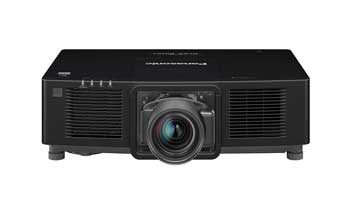
Panasonic PT-MZ16KL – 16,000-Lumen Education Projector for Large Venues
The Panasonic PT-MZ16KL is a high-performance Education Projector built for lecture halls, museums, and large classrooms. With an impressive 16,000 lumens of brightness and accurate color straight out of the box, it ensures crystal-clear visuals even in well-lit environments.
Key Specs
Price: $33,999
Resolution: WUXGA (1920 × 1200)
Technology: 3LCD Laser
Brightness: 16,000 lumens (measured 16,107)
Laser Life: 20,000 hours (Normal)
Weight: 49.2 lbs
Performance and Reliability
The PT-MZ16KL uses multiple laser diodes for brightness redundancy. If one fails, the others keep running, so performance stays close to full power. This makes it a reliable choice for schools and institutions that need consistent operation with minimal downtime.
Installation Flexibility
This projector supports seven interchangeable lenses, ranging from short throw to long zoom. That flexibility ensures easy placement in diverse environments. It also provides advanced tools like Projector Warping for curved surfaces and Edge Blending to create seamless multi-projector displays. These features are managed with Panasonic’s free Geometry Manager Pro software.
Connectivity and Monitoring
The PT-MZ16KL covers all professional inputs, including DVI-D, HDMI 2.0b, HDBaseT, and 3G-SDI. A rear Information Monitor displays system status, signal details, runtime, temperature, and error codes, making maintenance simple and efficient.
Final Verdict
Compact, powerful, and packed with features, the Panasonic PT-MZ16KL Education Projector stands out as one of the best options for large-scale installations. Whether in lecture halls, museums, or high-end educational spaces, it delivers stunning picture quality and professional-grade reliability.
👉 Learn more at Panasonic Education Projectors.
SONY VPL-VW5000ES / GTZ280
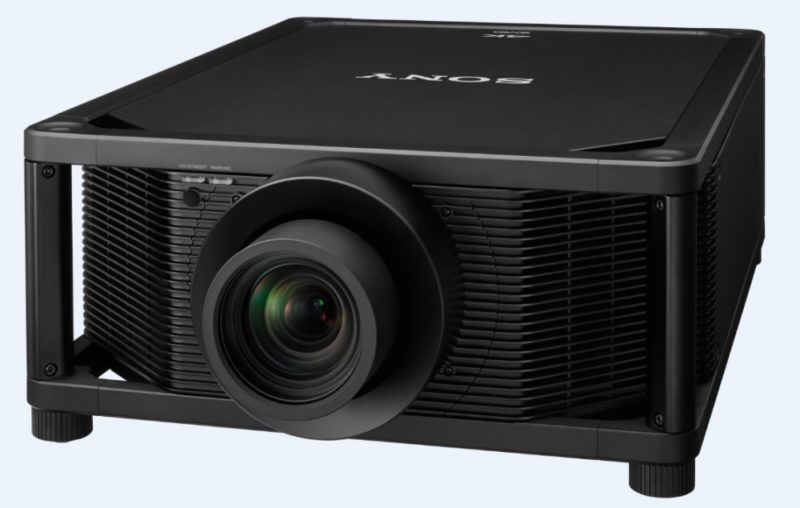
Sony VPL-VW5000ES & VPL-GTZ280 – High-End Education Projectors
The Sony VPL-VW5000ES and VPL-GTZ280 are premium Education Projectors built for large venues, training centers, and advanced visual environments. Both models deliver big, bright, and detailed images, making them ideal for classrooms, museums, and simulation spaces.
Specs (VW5000ES / GTZ280)
Price: $60,000
Technology: SXRD (3-chip)
Resolution: Native 4K (4096 × 2160)
Brightness: 5,000 lumens
Contrast: 20,000:1
Zoom Lens Ratio: 2.10:1
Lens Shift: Yes
Lamp Life: 20,000 hours
Weight: 94 lbs
Performance and Applications
The VW5000ES was once Sony’s most advanced home cinema projector, delivering natural skin tones, vivid HDR, and a wide BT2020 color gamut. It shines in art galleries, planetariums, museums, and high-end educational spaces.
The GTZ280, built for professional use, supports multi-projector 2D and 3D setups with uniform brightness across the screen. With an infrared laser module, it’s also ideal for pilot training and night-vision simulation.
Design and Lens Options
Both projectors use SXRD panels and a Z-Phosphor laser light engine, ensuring high contrast and rich, detailed colors—from deep blacks to vibrant reds, blues, and greens. Lens options include the VPLL-Z7008 short-throw and VPL-Z7103 standard lens, with motorized focus, zoom, and shift. Lens Memory saves up to five aspect ratios, such as 16:9 or 2.35:1, for quick switching.
Recognition and Legacy
The VW5000ES won Best Projector of the Year in 2016. While newer models like the VPL-GTZ380 surpass it in brightness, the VW5000ES and GTZ280 remain excellent choices for anyone seeking stunning image quality, flexible installation, and professional-grade performance.
👉 Explore more at Sony Education Projectors.
SONY VPL-GTZ380
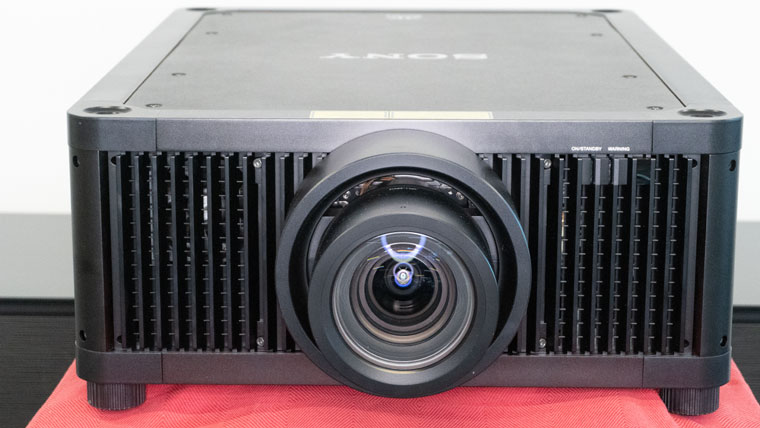
Sony VPL-GTZ380 – Flagship 10,000-Lumen 4K Education Projector
The Sony VPL-GTZ380 is a flagship Education Projector that delivers 10,000 lumens of brightness and native 4K SXRD resolution. Designed for premium classrooms, art galleries, museums, planetariums, and simulation spaces, it offers stunning visuals with professional reliability. Priced at $80,000 (lens not included), it represents Sony’s most advanced projection technology.
Key Specs
Price: $80,000 (without lens)
Technology: 3-chip SXRD
Resolution: Native 4K (4096 × 2160)
Brightness: 10,000 lumens
Contrast: ∞:1
Zoom Lens Ratio: 1.95:1 (VPLL-Z8014 Lens)
Lens Shift: Yes
Lamp Life: 20,000 hours
Weight: 112 lbs
Performance and Image Quality
The GTZ380 produces double the peak brightness of the VW5000ES and covers a wider color gamut for greater color volume. Its advanced red and blue laser diodes deliver the full DCI-P3 color space without brightness loss, making it ideal for HDR content, art exhibits, and scientific visuals. The X1 Ultimate processor enhances SDR and HDR performance, while ultra-deep blacks reduce visible banding in multi-projector edge blending setups.
Design and Flexibility
Despite its power, the GTZ380 is compact and quiet for its class, weighing 112 lbs, which is lighter than most 10,000-lumen projectors. It supports motorized zoom, lens shift, and lens memory, making installation easier in complex venues. It works with both the standard ARC-F zoom lens (VPLL-Z8014) and a short-throw option (VPLL-Z8008) for added flexibility.
Applications
This projector suits education, simulation, museums, planetariums, and ultra-premium home theaters. With true 4K clarity, exceptional brightness, and wide color accuracy, the GTZ380 is a top choice for professionals and institutions that demand the best in visual performance.
👉 Learn more at Sony Professional Education Projectors.
Christie DWU1400-GS
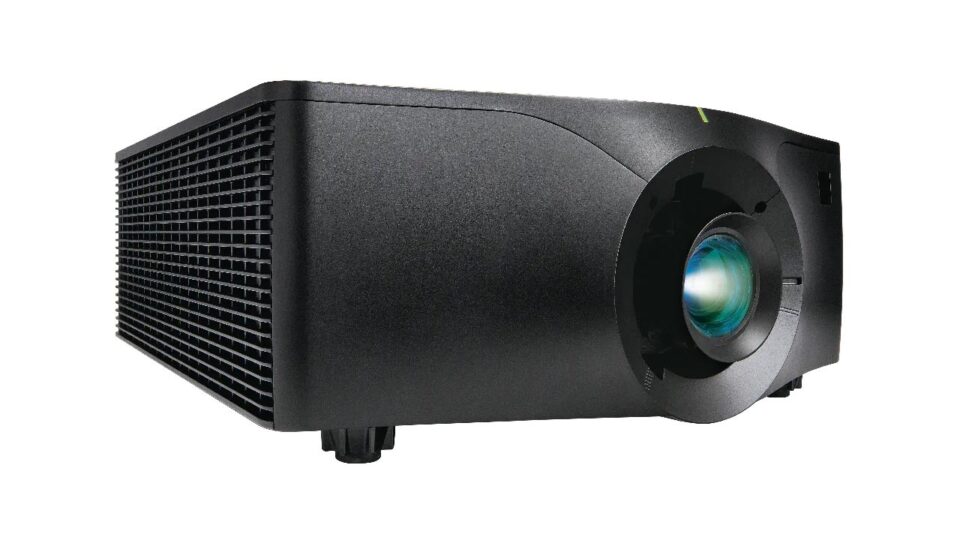
Christie DWU1400-GS – 12,500-Lumen Education Projector for Professional Use
The Christie DWU1400-GS is a powerful Education Projector that delivers 12,500 ANSI lumens of brightness with WUXGA (1920×1200) resolution. As the brightest model in Christie’s GS series, it provides stunning visuals for lecture halls, museums, trade shows, and professional installations. Despite its high output, it runs up to 20,000 hours at full power, even in 24/7 operation.
Key Specs
Price: $19,706 MSRP
Technology: 1DLP (0.67″ DMD)
Resolution: WUXGA (1920 × 1200)
Brightness: 12,500 ANSI lumens
Contrast: 6,000:1 Dynamic
Lens Shift: H: +30%, V: +100% (zoom lenses only)
Lamp Life: 20,000 hours (ECO2 mode)
Weight: 50.3 lbs (22.8 kg, without lens)
Performance and Flexibility
The DWU1400-GS combines high brightness with a compact design, making it easier to transport and set up than other projectors in its class. It supports seven interchangeable lenses, ensuring flexibility for venues of all sizes, and works seamlessly with all GS-series accessories.
With Christie Twist software, you can achieve precise edge blending and geometric correction for projection on any 2D or 3D surface. For faster, automated setup, Christie’s Mystique alignment system uses camera-based technology to fine-tune your image.
Applications
Trusted worldwide, Christie Digital competes with brands like Barco and Sony, offering reliability in professional projection. The DWU1400-GS is ideal for education, events, and large-scale installations, giving bright, accurate, and dependable performance.
👉 Learn more at Christie Education Projectors.
Education and Business Projector Buyer’s Guide: Conference Room / Lecture Hall
Projectors in the Conference Room/Lecture Hall category are usually bright, permanently installed units designed for bigger spaces. They’re a great fit for large university classrooms, lecture halls, auditoriums, and big K-12 multi-purpose rooms. Many of these projectors also offer multiple lens options, giving flexibility to match different installation needs.
MAXELL MP-JU4001
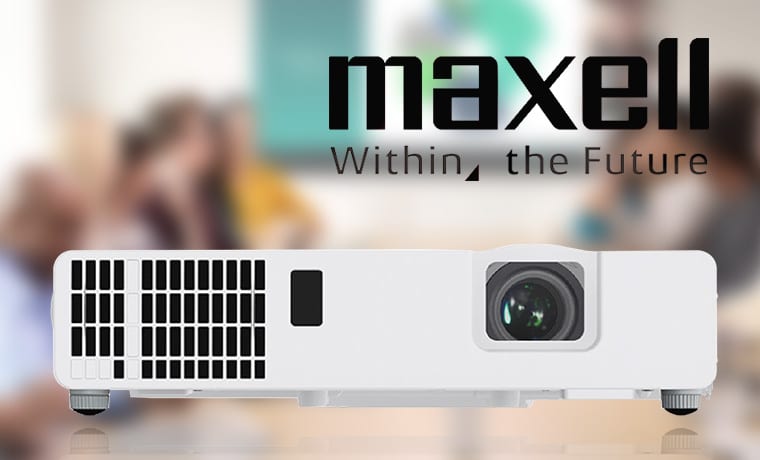
Maxell MP-JU4001 – Affordable Education Projector with 4,000 Lumens
The Maxell MP-JU4001 is a versatile Education Projector that delivers 4,000 lumens of brightness and WUXGA (1920×1200) resolution. Designed for classrooms, conference rooms, and training spaces, it combines sharp visuals with long-lasting reliability—at an affordable price.
Key Specs
Price: $1,829
Technology: 3LCD
Resolution: 1920 × 1200 (WUXGA)
Brightness: 4,000 lumens
Contrast: 2,000,000:1
Zoom Lens Ratio: 1.6:1
Lens Shift: No
Light Source Life: 20,000 hours (Normal & Whisper modes)
Performance and Features
The MP-JU4001 uses Maxell’s ceramic phosphor chip design, which makes the projector quieter and more efficient. Its laser engine lasts up to 20,000 hours, minimizing maintenance costs. Unlike many similarly priced DLP projectors, the 3LCD technology ensures equal color and white brightness for vibrant, accurate images.
It also supports 1080p content, IP-based content sharing, and direct projection from networks. This makes it easy to connect laptops, tablets, or smartphones. For specialized use, the projector includes DICOM SIM mode, ideal for medical education and training.
Connectivity and Control
The MP-JU4001 supports embedded networking, allowing users to manage multiple projectors, schedule events, and receive real-time alerts. It works with leading control systems like AMX, Crestron, and PJ-Link, making it easy to integrate into professional setups.
Why Choose It?
At under $2,000, the Maxell MP-JU4001 delivers excellent value. With 4,000 lumens of brightness, accurate color reproduction, and a low-maintenance design, it’s a reliable Education Projector for schools, businesses, and training environments.
👉 Explore more options at Maxell Education Projectors and compare models for your classroom or conference room.
LG BU50NST
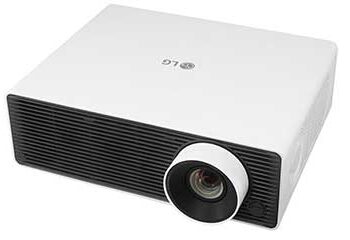
LG ProBeam BU50NST Review – Bright 4K Education Projector
The LG ProBeam BU50NST is a professional-grade Education Projector that delivers 4K UHD resolution (3840 × 2160) and 5,000 ANSI lumens of brightness. Compact yet powerful, it’s designed for classrooms, business settings, hospitals, and museums, offering sharp visuals and long-lasting reliability with a 20,000-hour laser light source.
Key Specs
Price: $4,499
Technology: DLP with XPR (0.47” DMD)
Resolution: 3840 × 2160 (4K UHD)
Brightness: 5,000 ANSI lumens
Contrast: 3,000,000:1
Zoom Lens Ratio: 1.6x
Lens Shift: Yes
Lamp Life: 20,000 hours
Weight: 21.4 lbs
Smart Features for Education and Business
Powered by LG WebOS, the BU50NST includes wireless screen mirroring (Miracast®), built-in Wi-Fi, and a web browser, making it easy to connect and share content. Its 1.6x zoom, lens shift, and 12-point warping function give installers plenty of flexibility, ensuring a perfect fit for classrooms, boardrooms, or auditoriums.
Standout Capabilities
DICOM Picture Mode – Designed for medical education and training visuals.
HDBaseT™ Support – Transmit 4K signals long distances with a single CAT6 cable.
Optical Lens Shift – Adjusts image placement without losing quality.
Bluetooth Audio – Connect wireless speakers, headphones, or smartphones.
Built-in Wi-Fi & WebOS – Access apps, files, and online content directly.
How It Compares
Competing models from Optoma, NEC, and BenQ also offer bright 4K projection, but the BU50NST stands out with its wireless connectivity, Bluetooth audio, and advanced installation features. Its polished WebOS platform makes operation simple and reliable.
Final Verdict
The LG ProBeam BU50NST is a bright, flexible, and smart Education Projector. It’s well-suited for classrooms, lecture halls, medical training, and museum displays, offering a complete package of sharp 4K visuals, easy setup, and modern wireless features.
👉 Learn more at LG ProBeam Official Page and compare it with other Education Projectors for your needs.
NEC P506QL
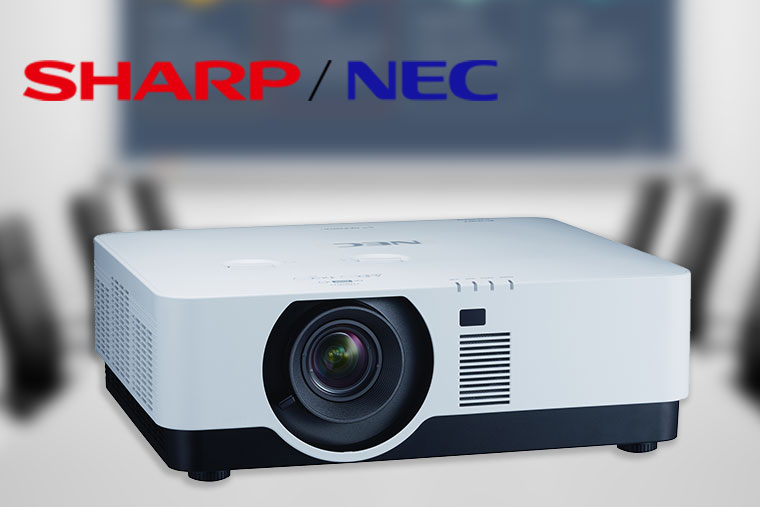
NEC P506QL Review – A Reliable 4K Education Projector
The NEC P506QL is a professional-grade Education Projector that combines sharp 4K UHD visuals with flexible installation options. With 5,000 ANSI lumens of brightness and a 20,000-hour laser light source, it delivers bright, long-lasting performance for classrooms, conference rooms, and museums.
NEC P506QL Specs
Price: $4,299
Technology: DLP Laser
Resolution: 1920 × 1080 ×4 (4K UHD on screen)
Brightness: 5,000 ANSI lumens
Contrast: 500,000:1 (with Light Adjust)
Zoom Lens Ratio: 1.5x
Lens Shift: Yes, manual H/V
Lamp Life: 20,000 hours
Weight: 25.4 lbs
Warranty: 5 years
Key Features
Flexible Setup – Manual horizontal/vertical lens shift and 1.5x zoom make installation simple.
Strong Connectivity – Includes dual HDMI, USB-A (with power), LAN port, and HDBaseT for 4K video/audio over 100m with CAT5e/CAT6.
Collaboration Ready – Can display up to four 1080p sources simultaneously on one screen.
DICOM Simulation Mode – Enhances grayscale for medical education and imaging simulations.
Easy Management – Compatible with NEC NaViSet Administrator2 for remote monitoring and control.
Why Choose the NEC P506QL?
The NEC P506QL stands out as a bright and versatile Education Projector. Its 4K resolution ensures sharp detail, while flexible installation options make it easy to set up in different spaces. Although it doesn’t include the advanced features of higher-end models, it offers excellent value with reliable laser performance, accurate color, and simple management tools.
Final Verdict
For schools, universities, training rooms, and museums, the NEC P506QL strikes a balance between price, brightness, and usability. It’s a dependable choice for anyone who needs long-lasting 4K projection without the premium cost of top-tier installation projectors.
👉 Learn more about the NEC P506QL on Sharp NEC’s Official Site or explore our Education Projector Guide for comparisons with other models.
MAXELL MP-TW4011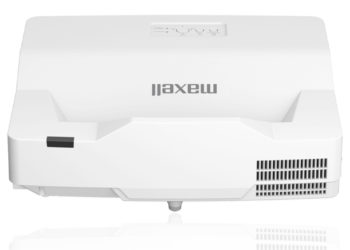
Maxell MP-TW4011 Review – A Durable Education Projector with 50,000-Hour Lifespan
The Maxell MP-TW4011 is an ultra-short throw Education Projector designed for classrooms that need reliability and interactivity. Its standout feature is the 50,000-hour lifespan in Long Life 2 Mode—the longest of any projector we’ve seen. Even with daily use in K-12 settings, it could last decades without needing replacement.
Maxell MP-TW4011 Specs
Price: $4,239
Resolution: WXGA (1280×800)
Technology: 3LCD Laser
Brightness (Claimed): 4,200 lumens
Measured Brightness (Brightest Mode): 2,300 lumens
Light Engine Life: Up to 50,000 hours
Weight: 17.4 lbs
Performance & Features
The WXGA resolution is sharp enough for most classrooms, making it ideal for lessons, videos, and presentations. While higher-resolution models like WUXGA projectors may suit advanced courses such as CAD or film studies, K-12 schools will find WXGA more than sufficient.
One of the biggest advantages of the MP-TW4011 is its interactive capability. Teachers can turn lessons into engaging, hands-on experiences, helping students stay focused and involved. This makes it an excellent tool for active learning environments.
The projector also supports optional wireless connectivity through a USB adapter and Maxell’s Projector Quick Connection app, allowing teachers and students to mirror or control the display using smartphones or tablets.
Verdict
The Maxell MP-TW4011 Education Projector delivers unbeatable value with its record-breaking 50,000-hour lifespan, strong brightness, and interactive learning tools. It’s a perfect fit for K-12 classrooms and university lecture halls, especially when paired with multiple units. For schools that need a long-lasting, interactive, and low-maintenance solution, this projector is one of the smartest investments available.
👉 Learn more from Maxell’s official projector page or check out our Education Projector Guide for comparisons with other classroom-ready models.
OPTOMA ZU506T-W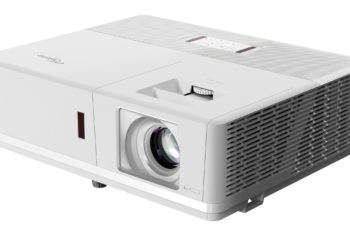
Optoma ZU506T-W Review – A Bright and Affordable Education Projector
The Optoma ZU506T-W earned the Best in Classroom Price/Performance Award in 2020–2021, and it’s easy to see why. This Education Projector delivers 5,000 lumens of brightness with laser technology, making it reliable for classrooms, lecture halls, and training environments. With DICOM support, it can also display detailed medical images such as MRIs and CAT scans—perfect for healthcare education.
Optoma ZU506T-W Specs
Price: $2,799
Resolution: WUXGA (1920×1200)
Technology: DLP Laser
Brightness (Claimed): 5,000 lumens
Measured Brightness: 4,380 lumens
Light Engine Life: Up to 30,000 hours
Weight: 12.1 lbs
Warranty: 5 years (with 3-year replacement program)
Performance & Features
In testing, the ZU506T-W measured 4,380 lumens at peak brightness, while most modes delivered between 3,800–3,900 lumens. Unlike many DLP projectors that skew green at max brightness, this Optoma maintains solid color accuracy with only a slight brightness trade-off.
The projector includes a 1.6x zoom and 15% vertical lens shift, offering good installation flexibility for its size. While 3LCD projectors often provide more range, this is still impressive for a compact DLP model.
Connectivity is another strength. It comes with a wide selection of modern and legacy inputs, a mic input for classrooms, and HDBaseT support for sending video, audio, and control signals over a single long-distance CAT cable.
Verdict
The Optoma ZU506T-W Education Projector combines brightness, color accuracy, and flexibility in a lightweight 12 lb design. Add in its 30,000-hour laser lifespan, 5-year warranty, and 3-year replacement program, and it’s one of the best classroom projectors in its price range.
👉 Learn more on the Optoma official site or check our Education Projector Buying Guide for side-by-side comparisons.
PANASONIC PT-VMZ50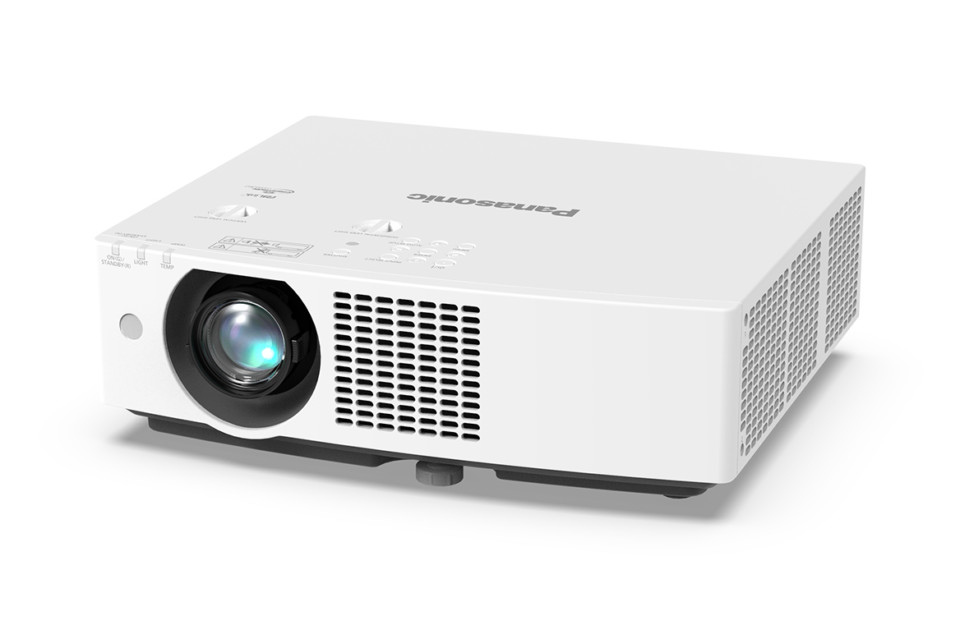
Panasonic PT-VMZ50U Review – A Compact and Bright Education Projector
The Panasonic PT-VMZ50U earned the Best in Classroom Performance Award in 2020–2021. This Education Projector delivers 5,000 lumens of brightness and features a 3LCD laser light engine rated for 20,000 hours of use. Despite its power, it stays compact at 16″ × 5″ × 14″ and weighs only 15.9 lbs, making it easy to move between classrooms, labs, or meeting spaces.
Panasonic PT-VMZ50U Specs
Price: $2,499
Resolution: WUXGA (1920 × 1200)
Technology: 3LCD Laser
Brightness (Claimed): 5,000 lumens
Measured Brightness: 5,042 lumens
Light Engine Life: 20,000 hours
Weight: 15.9 lbs
Performance & Features
The PT-VMZ50U sits in the middle of Panasonic’s portable laser lineup, between the VMZ40U (4,500 lumens) and the VMZ60U (6,000 lumens). With its balanced performance, it’s ideal for large K–12 classrooms, multipurpose rooms, or higher education lecture halls.
Key highlights include:
Digital Image Zoom – Magnify details like maps, blueprints, or diagrams up to 3x.
Wireless & Wired LAN – Share screens from laptops, tablets, or phones using Panasonic’s free apps.
HDBaseT Support – Send video, audio, and control signals up to 100m with a single CAT6 cable.
Built-in 10W Speaker – Convenient for classrooms without external sound systems.
4K Input Support – Accepts 4K content (up to 30fps) while displaying in WUXGA for clear and modern visuals.
Verdict
The Panasonic PT-VMZ50U Education Projector combines brightness, portability, and advanced features in one compact package. With long-life laser performance, 4K compatibility, and flexible connectivity, it’s an excellent choice for schools and universities that need reliable projection in versatile learning environments.
👉 Learn more on the Panasonic official site or check our Education Projector Buying Guide to compare top models.
VIVITEK DH3660Z
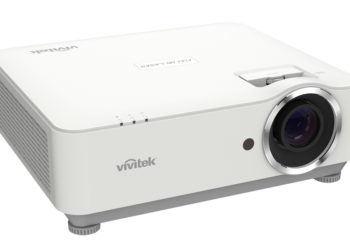
Vivitek DH3660Z Review – A Bright and Versatile Education Projector
The Vivitek DH3660Z is a 1080p DLP laser projector designed for both business and education. With 4,500 lumens of brightness (4,269 measured), it delivers clear, vivid images enhanced by its 20,000-hour laser light engine. At 15.4 lbs, it balances portability with performance, making it a strong choice for classrooms, meeting rooms, and more.
Vivitek DH3660Z Specs
Price: $2,499
Resolution: 1920 × 1080 (Full HD)
Technology: DLP Laser
Brightness (Claimed): 4,500 lumens
Measured Brightness: 4,269 lumens
Lamp Life: 20,000 hours
Weight: 15.4 lbs
Features & Performance
The DH3660Z provides strong installation flexibility with a 1.5x manual zoom lens, +13% vertical lens shift, and 360° projection capability, making setup easy in different environments.
Other highlights include:
RGBY Color Wheel – Delivers richer, more accurate colors.
10W Built-in Speaker – Suitable for smaller classrooms or meeting spaces.
NovoConnect Wireless Support – Allows laptops, tablets, and smartphones to connect easily (with compatible NovoConnect devices).
DICOM Simulation Mode – Displays X-rays and medical images, useful for medical education and training.
Where It Fits Best
Although built for conference rooms, the DH3660Z also excels in:
K–12 classrooms
Multipurpose spaces
Small auditoriums
Museums and exhibitions
Houses of worship
Medical classrooms
Verdict
The Vivitek DH3660Z Education Projector combines brightness, flexibility, and durability in one compact design. With its wireless options, DICOM simulation mode, and long-life laser engine, it’s a reliable choice for schools, businesses, and training facilities.
👉 Learn more on the Vivitek official site or explore our full Education Projector Guide to compare the best models for your needs.
OPTOMA EH330UST
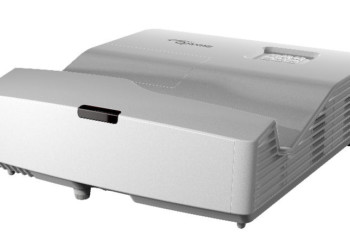
Optoma EH330UST Review – Ultra-Short Throw Education Projector
The Optoma EH330UST is a 3,600-lumen Full HD Education Projector designed for classrooms, training rooms, and offices. Its ultra-short throw lens projects a 100-inch image from just a few inches away, making it perfect for wall-mounted setups in tight spaces.
Optoma EH330UST Specs
Price: $1,599
Technology: DLP
Native Resolution: 1920 × 1080 (Full HD)
Max Resolution: 1920 × 1200 (WUXGA)
Brightness: 3,600 lumens
Contrast: 20,000:1
Lens: Fixed (no zoom, no shift)
Lamp Life: 4,000 hours
Weight: 8.7 lbs
Key Features & Performance
Ultra-Short Throw Projection – Creates a 100-inch screen from a few inches away, ideal for classrooms with limited space.
Wireless Ready – Works with the optional HDCast Pro ($80) for screen mirroring from Android, iOS, Windows, or Mac devices.
PC-Free Presenting – Display Word, Excel, PowerPoint, or JPEGs directly from a USB drive.
Advanced Networking – Compatible with Crestron RoomView, PJLink, Extron XTP, and AMX for centralized control across schools or offices.
LAN Connectivity – Easy wired networking and monitoring.
Where It Fits Best
The EH330UST Education Projector is a strong fit for:
K–12 classrooms – Perfect for interactive lessons and wall-mounted setups.
Business meeting rooms – Delivers bright, clear presentations in compact spaces.
Training environments – Works well when projection distance is limited.
Verdict
The Optoma EH330UST is an affordable, versatile, and classroom-ready ultra-short throw projector. With PC-free presentation, wireless options, and robust networking support, it delivers excellent value for schools, offices, and training facilities.
👉 Learn more from the Optoma official site or explore our full Education Projector Guide for side-by-side comparisons.
Sony VPL-FHZ85
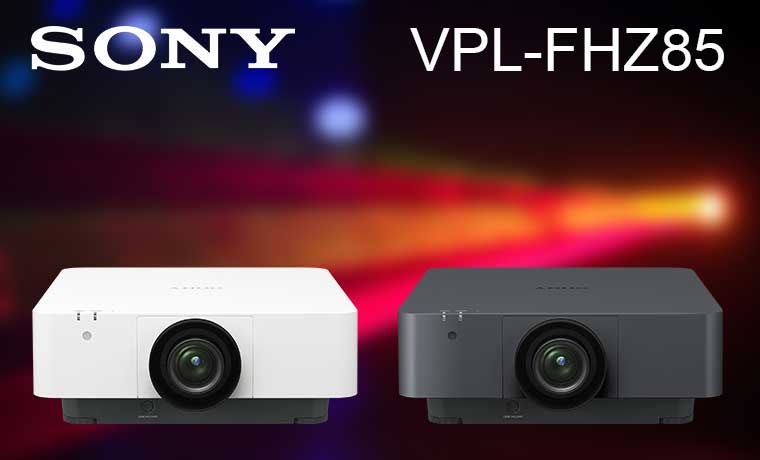
Sony VPL-FHZ85 Review – High-Brightness Education Projector
The Sony VPL-FHZ85 is a 7,300-lumen (8,000 center lumen) 3LCD laser Education Projector designed for lecture halls, boardrooms, museums, and mid-sized auditoriums. At $6,999 MSRP, it combines brightness, color accuracy, and flexibility in one compact design.
Sony VPL-FHZ85 Specs
Price: $6,999
Technology: 3LCD Laser
Resolution: WUXGA (1920 × 1200)
Brightness: 7,300 ANSI lumens / 8,000 center lumens
Contrast: ∞:1
Zoom Lens Ratio: 1.6x
Lens Shift: Yes
Lamp Life: 20,000 hours
Weight: 13 lbs
Key Features & Performance
Bright and Vivid Images – Produces excellent color and sharpness even in high ambient light.
Compact & Lightweight – Sony’s smallest projector in this brightness class, easy to install or reposition.
Long-Lasting Laser Engine – Runs up to 20,000 hours, offering nearly a decade of use with minimal maintenance.
Advanced Color Technology – Built with BrightEra LCD panels and Z-Phosphor laser, ensuring high color volume without brightness loss.
Flexible Installation – Supports interchangeable lenses, lens shift, and zoom for seamless setup in various venues.
Where It Fits Best
The VPL-FHZ85 Education Projector is an excellent choice for:
Lecture halls and classrooms
Boardrooms and corporate spaces
Museums and retail installations
Small to medium-sized auditoriums
Verdict
The Sony VPL-FHZ85 combines high brightness, vibrant colors, and professional features in a compact form. With its reliable 20,000-hour laser engine and flexible installation options, it’s a top pick for schools, businesses, and cultural spaces needing a premium Education Projector.
👉 Learn more from the Sony official site or check our full Education Projector Guide for detailed comparisons.
Panasonic PT-MZ880
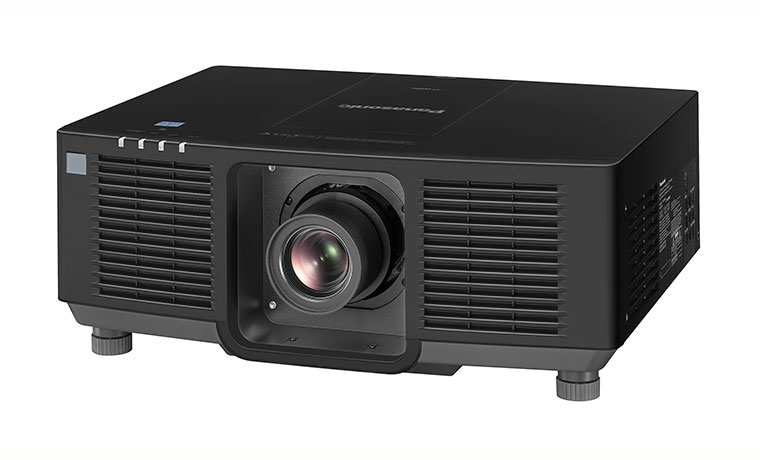
Panasonic PT-MZ880 Review – Bright and Reliable Education Projector
The Panasonic PT-MZ880 is a professional WUXGA Education Projector that delivers 8,000 lumens of brightness with a 3LCD laser engine rated for 20,000 hours of use. Priced at $7,499, it’s designed for classrooms, lecture halls, and professional spaces that need high brightness, flexibility, and long-term reliability.
Panasonic PT-MZ880 Specs
Price: $7,499
Technology: 3LCD Laser
Resolution: WUXGA (1920 × 1200)
Brightness: 8,000 lumens
Contrast: 3,000,000:1
Zoom Lens Ratio: 1.61–2.76:1
Lens Shift: Yes (motorized)
Lamp Life: 20,000 hours
Weight: 41 lbs
Features & Performance
Ultra-Bright Projection – Multiple laser modules ensure sharp, vibrant images even in rooms with strong ambient light.
Quiet Operation – Keeps lectures and meetings focused without background noise.
Flexible Setup – Motorized lens system with optional lenses, including ultra-short throw options.
Versatile Connections – HDMI, DVI-D, SDI, and DIGITAL LINK/LAN (HDBaseT) support modern AV needs.
4K-Ready Input – Accepts 4K content for sharper, more detailed visuals via HDMI or HDBaseT.
Wireless Collaboration – Works with Panasonic PressIT™, enabling plug-and-play presentations without hassle.
Durable and Long-Lasting – Built for continuous use in education and business environments.
Where It Fits Best
The PT-MZ880 Education Projector is ideal for:
Classrooms and lecture halls
Conference rooms and training spaces
High-use environments needing daily reliability
Verdict
The Panasonic PT-MZ880 combines high brightness, quiet operation, and flexible installation in one package. With its laser engine, 4K-ready input, and wireless collaboration tools, it’s a strong choice for schools, universities, and professional venues that need a premium Education Projector.
👉 Learn more on the Panasonic official site or explore our full Education Projector Guide for comparisons.
Panasonic PT-FRZ60
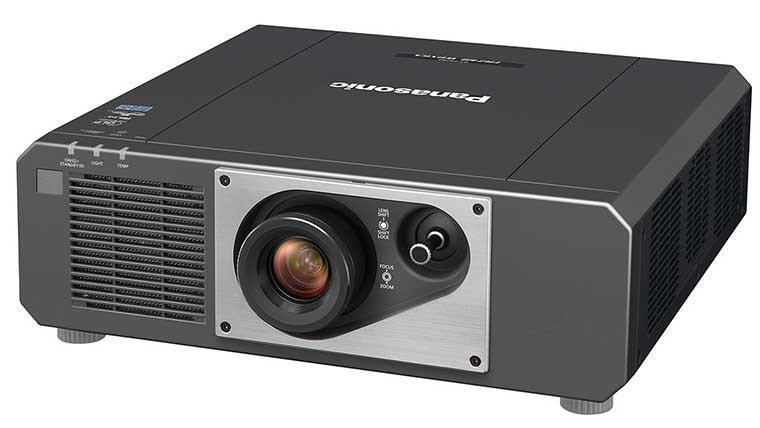
Panasonic PT-FRZ60 Review – Bright and Reliable Education Projector
The Panasonic PT-FRZ60 is a WUXGA Education Projector designed for classrooms, lecture halls, and museums. With 6,000 lumens of brightness and a laser/phosphor light engine rated for 20,000 hours, it delivers clear, vivid images with low maintenance.
Panasonic PT-FRZ60 Specs
Price: $4,299
Technology: DLP Laser
Resolution: WUXGA (1920×1200)
Brightness: 6,000 lumens
Contrast: 20,000:1
Zoom Lens Ratio: 1.46–2.94:1
Lens Shift: Yes
Lamp Life: 20,000 hours
Weight: 35.5 lbs
Features & Performance
Flexible Setup – A 2.0x zoom lens with wide vertical and horizontal lens shift makes installation easy.
4K-Ready Input – Supports 4K@60P content via HDMI and HDBaseT for sharper details.
Comprehensive Connectivity – Includes HDMI 2.0 and Digital Link (HDBaseT) for modern AV integration.
Accurate Color – Produces vibrant, true-to-life images out of the box.
Quiet Operation – Runs at just 30 dB in quiet mode, impressive for a 6,000-lumen model.
Built to Last – A durable design with a 3-year parts and labor warranty (or 12,000 hours).
Where It Fits Best
The PT-FRZ60 Education Projector is perfect for:
Lecture halls
Museums
Classrooms and training spaces
Verdict
The Panasonic PT-FRZ60 delivers bright, colorful, and reliable performance with excellent installation flexibility. For schools, universities, or museums that need high-quality visuals and low-maintenance operation, it’s one of the best Education Projector options in its class.
👉 Learn more on the Panasonic official site or check our Education Projector Guide for comparisons.
LG PROBEAM BU60PST
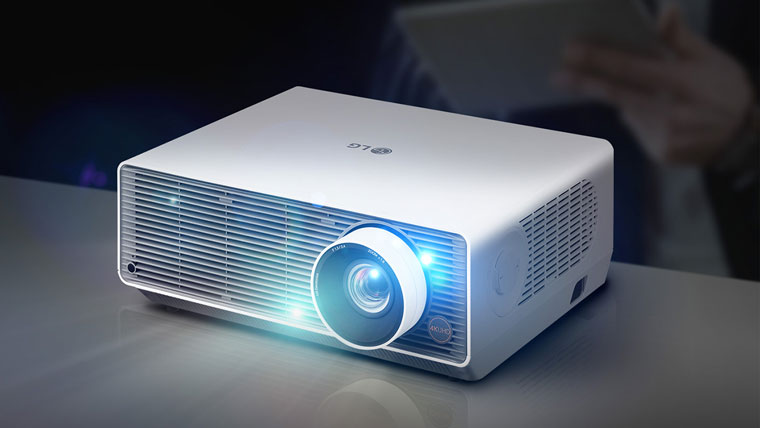
LG ProBeam BU60PST Review – Bright 4K Education Projector
The LG ProBeam BU60PST is a compact 4K Education Projector (3840×2160) built for classrooms, conference rooms, hospitals, and museums. With 6,000 ANSI lumens of brightness and a laser phosphor light engine rated for 20,000 hours, it delivers sharp images and long-lasting performance, even in rooms with ambient light.
LG ProBeam BU60PST Specs
Price: $4,499
Technology: DLP Laser
Resolution: 3840×2160 (4K UHD)
Brightness: 6,000 lumens
Contrast: 3,000,000:1
Zoom Lens Ratio: 1.3–2.1x
Lens Shift: Yes
Lamp Life: 20,000 hours
Weight: 21.4 lbs
Features & Performance
Flexible Installation – Offers 1.6x zoom, horizontal and vertical lens shift, and 12-point warping for precise screen alignment.
Smart Connectivity – Supports wired and wireless networks, screen mirroring, and direct USB viewing of Microsoft Office files.
Wireless Audio – Bluetooth output connects easily to speakers or AV systems.
Bright, Clear Image – 4K UHD resolution and high brightness ensure crisp visuals in both classrooms and professional environments.
Reliable and Durable – Laser engine provides up to 20,000 hours of low-maintenance use.
Where It Fits Best
The LG ProBeam BU60PST Education Projector works perfectly in:
Classrooms and lecture halls
Conference and meeting rooms
Hospitals and museums
Verdict
The LG ProBeam BU60PST combines 4K clarity, 6,000 lumens of brightness, smart wireless features, and flexible installation in a compact body. It stands out as one of the best Education Projector options in its price range for schools, universities, and professional spaces.
👉 Learn more on the LG official projector page or check our in-depth Education Projector Guide for comparisons.
LG ProBeam BU70QGA Professional Projector
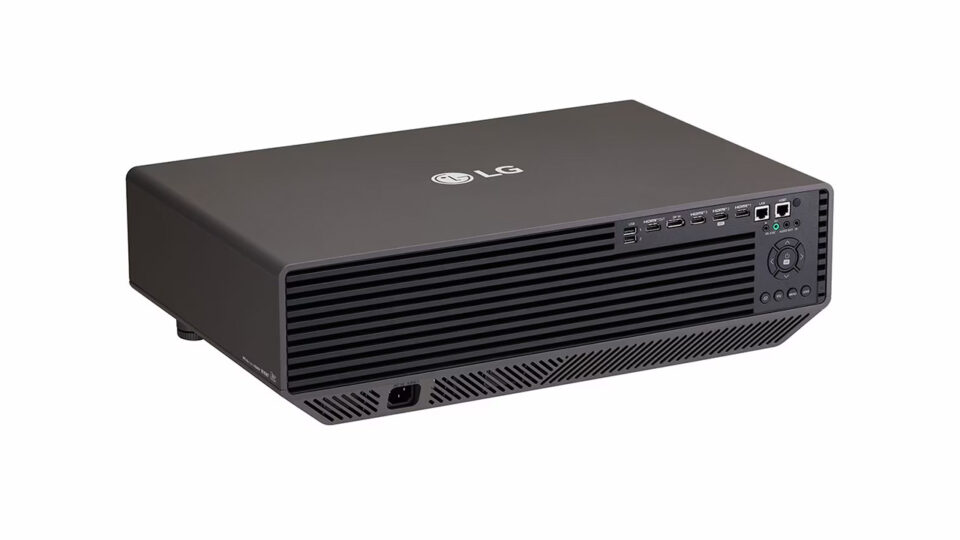
LG ProBeam BU70QGA Review – Bright 4K Education Projector
The LG ProBeam BU70QGA is a flagship Education Projector that combines 4K UHD clarity with exceptional brightness. Priced at $5,499, it delivers 7,000 ANSI lumens and a 3,000,000:1 dynamic contrast ratio, making it a strong performer for classrooms, lecture halls, offices, and even digital signage.
LG ProBeam BU70QGA Specs
Price: $5,499
Technology: DLP Laser
Resolution: 3840×2160 (4K UHD)
Brightness: 7,000 lumens
Contrast: 3,000,000:1 (Dynamic)
Zoom Lens Ratio: 1.6x optical
Lens Shift: H: ±28%, V: +60% / -33%
Lamp Life: 20,000 hours
Weight: 39 lbs
Features & Performance
Smart Lens System – Auto lens shift, zoom, and focus simplify installation.
Flexible Setup – Wide lens shift and 1.6x optical zoom support various room layouts.
Strong Connectivity – Equipped with dual RJ45 ports (HDBaseT and LAN), plus wired and wireless networking.
Long-Lasting Reliability – Laser light engine rated for 20,000 hours of use.
Integrated Platform – Runs webOS 6.0 for Signage, allowing built-in content management for digital signage or education.
Where It Fits Best
The LG ProBeam BU70QGA Education Projector is ideal for:
Lecture halls and classrooms
Conference and meeting rooms
Simulation environments
Digital signage installations
High-end home theaters
Verdict
The LG BU70QGA combines 4K clarity, 7,000 lumens brightness, flexible lens options, and webOS smart features into one powerful package. It excels as an Education Projector for schools and universities, while also offering the performance needed for professional signage, simulations, and premium home use.
👉 Learn more on the LG official site or explore our Education Projector Guide for more comparisons.
Ricoh WUL6690 WUXGA Laser DLP Projector
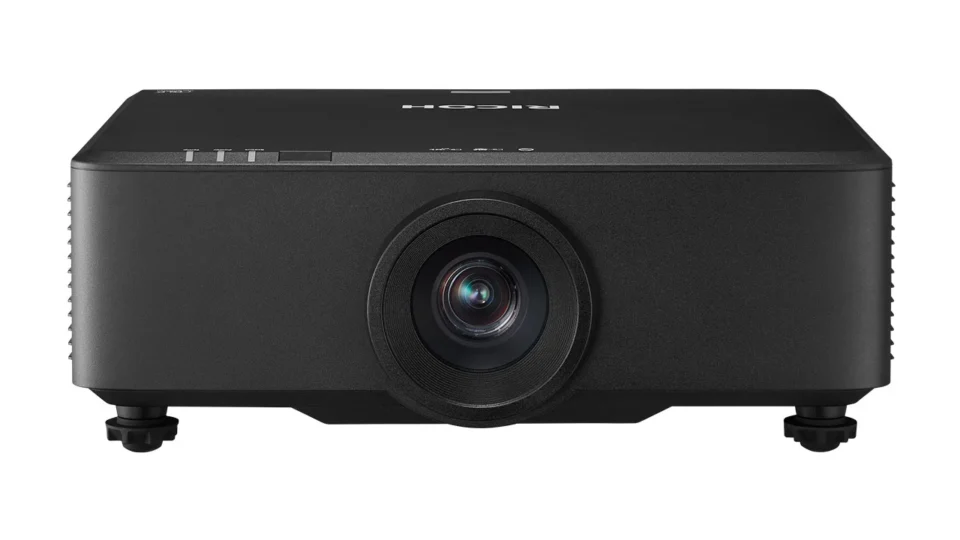
Ricoh PJ-WUL6690 Review – Bright Education Projector for Large Venues
The Ricoh PJ-WUL6690 is a high-performance Education Projector built for lecture halls, conference rooms, and large venues. Priced at $8,500, it delivers 9,600 ANSI lumens of brightness with WUXGA (1920×1200) resolution, ensuring sharp and vibrant images even in well-lit environments. With a long-throw lens, it can project images up to 300 inches diagonally, making it ideal for large-scale presentations.
Ricoh PJ-WUL6690 Specs
Price: $8,500
Technology: DLP Laser
Resolution: WUXGA (1920×1200)
Brightness: 9,600 ANSI lumens
Contrast: 3,800,000:1 (Dynamic)
Zoom Lens Ratio: 1.6x
Lens Shift: H: 0–55°, V: 0–25°
Lamp Life: 20,000 hours
Weight: 29.7 lbs
Key Features & Performance
Large-scale projection – Display up to 300 inches, with dual-projector blending for even bigger visuals.
Flexible installation – Electronic lens shift, zoom, and focus simplify setup.
Geometric correction – Corner adjustment and multipoint warping allow clear projection on uneven or curved surfaces.
Reliable design – Multi-module laser system ensures stable output even if one diode fails.
Bright and vivid – Excellent for lecture halls, classrooms, conference rooms, and event spaces.
Who It’s For
The Ricoh PJ-WUL6690 Education Projector is a great fit for:
Schools and universities – Perfect for lecture halls and auditoriums.
Corporate offices & government agencies – For conferences and training sessions.
Hospitals & medical education – Ideal for presentations and medical imaging.
Hospitality & retail – For events and large-scale displays.
Verdict
The Ricoh PJ-WUL6690 combines ultra-high brightness, flexible installation, and a reliable multi-laser system. As an Education Projector, it excels in professional spaces that demand clear, vivid, and large-scale projection. Whether in lecture halls, auditoriums, or corporate environments, it delivers performance you can rely on.
👉 Learn more from Ricoh’s official site or explore our full Education Projector Guide for comparisons with other models.
BenQ LU9750 PRO WUXGA 8,500 Lumen Large Venue Laser DLP Projector
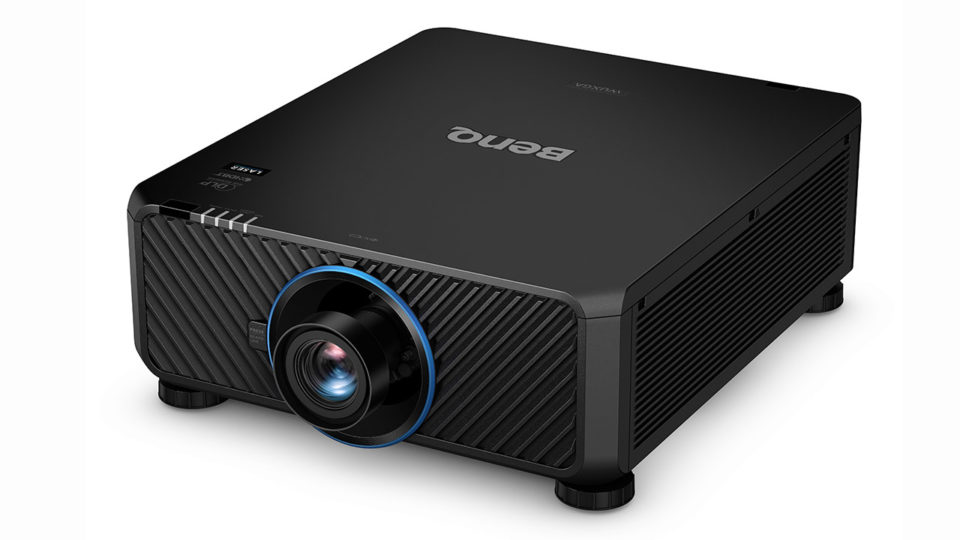
BenQ LU9750 Review – Ultra-Bright Education Projector for Large Venues
The BenQ LU9750 is a powerful Education Projector designed for large-scale installations. With 8,500 ANSI lumens and WUXGA (1920×1200) resolution, it delivers bright, sharp images even in well-lit rooms. Priced at $11,999, this professional DLP laser projector supports interchangeable lenses (sold separately) and is built for museums, galleries, trade shows, and lecture halls.
BenQ LU9750 Specs
Price: $11,999 MSRP (lenses optional)
Technology: DLP Laser
Resolution: WUXGA (1920×1200)
Brightness: 8,500 ANSI lumens
Contrast: 3,000,000:1 (Dynamic)
Zoom Lens Ratio: Varies by lens
Lens Shift: Yes
Lamp Life: 20,000 hours (Normal Mode), up to 70,000 hours (Dimming Mode)
Weight: 58.2 lbs
Key Features & Performance
Ultra-bright output – 8,500 lumens ensure visibility in bright classrooms, auditoriums, and event halls.
Flexible installation – Supports 360° mounting, 24/7 operation, and up to nine optional motorized lenses.
Durable laser engine – BenQ’s BlueCore laser lasts up to 20,000 hours, with dimming mode extending life to 70,000 hours.
Versatile usage – Works seamlessly in single or multi-projector setups.
Professional focus – Offers precise installation control, excellent image quality, and long-term reliability.
Best Use Cases
The BenQ LU9750 Education Projector is ideal for:
Universities and lecture halls – Perfect for large-scale presentations.
Museums and galleries – Delivers vivid images for exhibits.
Corporate events and conferences – Handles big screens with ease.
Trade shows and auditoriums – Bright enough for demanding environments.
Verdict
The BenQ LU9750 combines high brightness, flexible lens options, and a long-lasting laser engine, making it one of the best choices for professional and educational installations. Its ability to run 24/7 with consistent performance ensures reliability in any large venue.
👉 Learn more on the BenQ official site or explore our full Education Projector Guide for comparisons with other large-venue models.
Optoma ZU920TST PRO WUXGA 8,200 Lumen Laser Projector
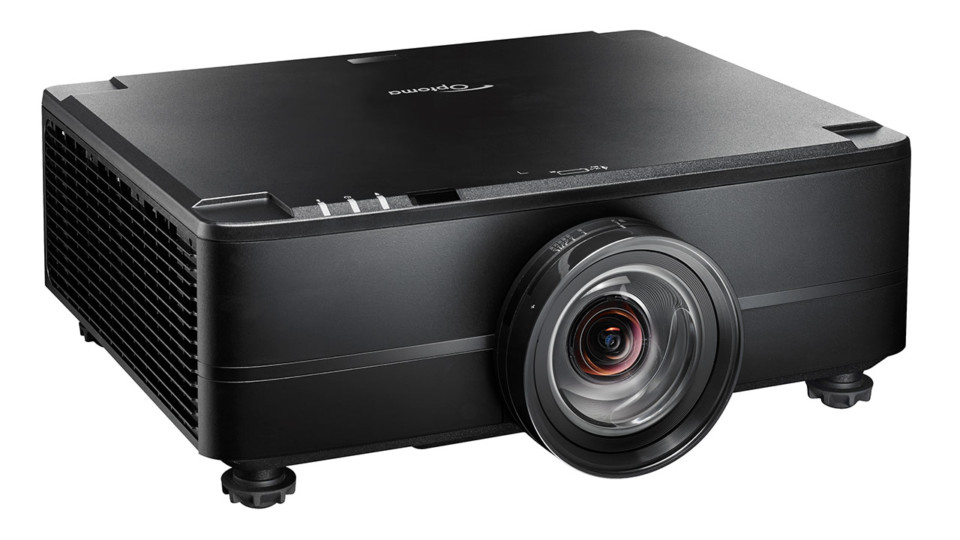
Optoma ZU920TST Review – Ultra-Bright Education Projector for Professional Spaces
The Optoma ZU920TST is a high-performance Education Projector designed for professional and creative environments. With 8,200 ANSI lumens and WUXGA (1920×1200) resolution, it delivers bright, sharp, and reliable visuals. Priced at $12,999, this DLP laser model is perfect for digital signage, simulations, and immersive multi-projector setups.
Optoma ZU920TST Specs
Price: $12,999
Technology: DLP Laser
Resolution: WUXGA (1920×1200)
Brightness: 8,200 ANSI lumens
Contrast: 3,000,000:1 (Dynamic)
Zoom Lens Ratio: 1.15x
Lens Shift: Yes
Lamp Life: 20,000 hours (Normal Mode), up to 30,000 hours (ECO)
Weight: 30.86 lbs
Inputs: 3× HDMI, supports 4K @ 60 fps
Key Features & Benefits
Short-throw fixed lens – Projects large images in tight spaces, ideal for classrooms or simulation labs.
Motorized lens adjustments – Offers zoom and full lens shift for flexible installation.
Durable DuraCore laser engine – Up to 20,000 hours in normal mode and 30,000 hours in ECO for long-term reliability.
Versatile applications – Works well for digital signage, projection mapping, simulation, and education setups.
Best Use Cases
The Optoma ZU920TST Education Projector is best suited for:
Universities and lecture halls – Large, bright screens for clear visibility.
Museums and galleries – Vivid images for immersive exhibits.
Theme parks and simulations – Handles creative, multi-projector environments.
Digital signage and corporate events – Perfect for impactful displays.
Verdict
The Optoma ZU920TST stands out with its short-throw lens, motorized adjustments, and long-lasting laser performance. Its ultra-bright output and flexible installation make it one of the best projectors for education, simulation, and large-scale professional spaces.
👉 Learn more on the Optoma official site or compare with other models in our Education Projector Guide.
Epson PRO EB-PU1008W 3LCD Large Venue Laser Projector
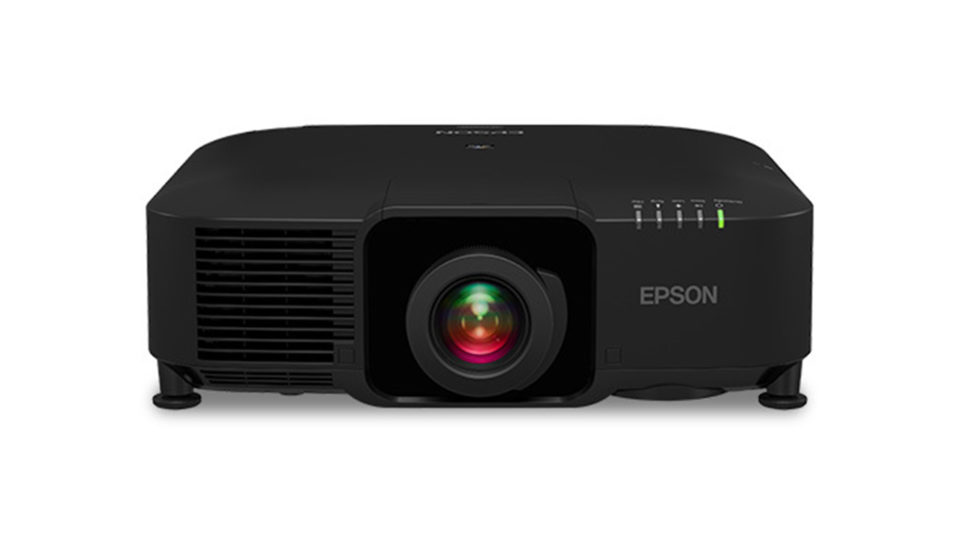
Epson EB-PU1008W Review – High-Brightness Education Projector
The Epson EB-PU1008W is a WUXGA 4K-enhanced laser Education Projector that delivers an impressive 8,500 ANSI lumens. Despite its high output, it remains compact and lightweight, making it easier to install than many large-venue models. Priced at $10,593, it’s a strong choice for professional and educational spaces that demand both brightness and reliability.
Epson EB-PU1008W Specs
Price: $10,593
Technology: 3LCD Laser
Resolution: WUXGA (1920×1200), 4K-enhanced
Brightness: 8,500 ANSI lumens
Contrast: 2,500,000:1 (Dynamic)
Zoom Lens Ratio: Varies (supports multiple optional lenses)
Lens Shift: Yes
Lamp Life: 20,000 hours (Normal Mode)
Weight: 35.9 lbs
Key Features
High brightness & durability – 8,500 lumens of vivid projection and up to 20,000 hours of laser life.
Flexible lens options – Compatible with a wide range of interchangeable Epson lenses for different setups.
Compact design – Lighter and more portable than most large-venue projectors.
Professional versatility – Perfect for auditoriums, lecture halls, and performance spaces.
Best Use Cases
The Epson EB-PU1008W Education Projector is ideal for:
Universities and lecture halls – Bright enough to cut through ambient light.
Museums and galleries – Sharp, clear images for exhibits.
Conference centers and auditoriums – Flexible installation for professional presentations.
Verdict
The Epson EB-PU1008W delivers exceptional brightness, reliable laser performance, and flexible installation options. Its compact size and interchangeable lenses make it a versatile solution for large professional and educational venues.
👉 Learn more on the Epson official site or compare it with other models in our Education Projector Guide.
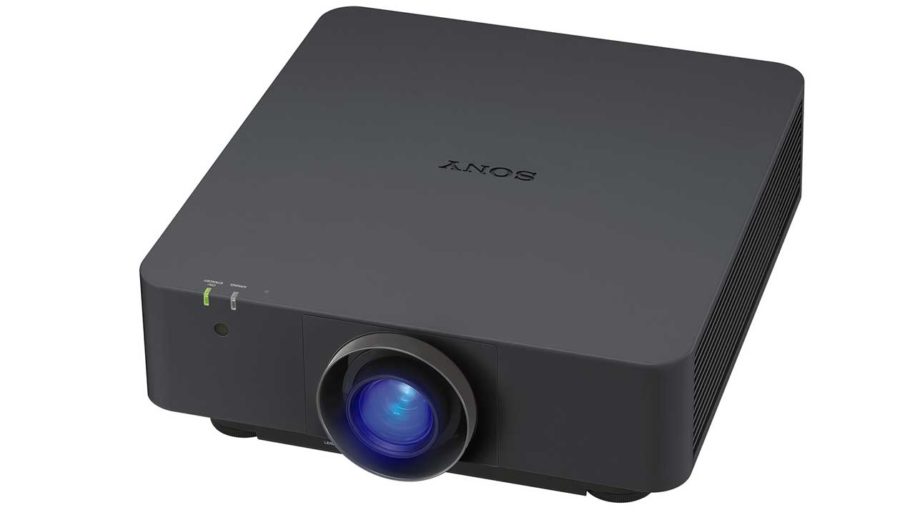
Sony VPL-FHZ85 Review – Bright and Versatile Education Projector
The Sony VPL-FHZ85 is a 7,300 ANSI lumens (8,000 center lumens) 3LCD laser Education Projector designed for professional and educational use. Priced at $6,999 MSRP, it combines high brightness, excellent color accuracy, and flexible installation options, making it a strong fit for classrooms, lecture halls, and beyond.
Sony VPL-FHZ85 Specs
Price: $6,999
Technology: 3LCD Laser
Resolution: WUXGA (1920×1200)
Brightness: 7,300 ANSI lumens / 8,000 center lumens
Contrast: Infinity Dynamic
Zoom Lens Ratio: 1.6x
Lens Shift: Yes
Lamp Life: 20,000 hours
Weight: 29 lbs (13 kg)
Key Features
Laser-powered reliability – A long-lasting 20,000-hour light engine ensures consistent performance.
Interchangeable lenses – Offers flexibility for different classroom or professional environments.
Bright and vivid images – Performs well in spaces with ambient light while maintaining accurate colors.
Versatile applications – Ideal for education, boardrooms, museums, retail, and houses of worship.
Best Use Cases
The Sony VPL-FHZ85 Education Projector works best in:
Higher education lecture halls – Clear projection for large audiences.
Corporate boardrooms – Professional-grade visuals for presentations.
Museums and retail displays – Vivid colors and detail in bright spaces.
Small entertainment venues – Flexible installation for immersive experiences.
Verdict
The Sony VPL-FHZ85 stands out as a bright, reliable, and flexible Education Projector. With its powerful 3LCD laser technology and professional installation features, it’s a smart choice for schools, businesses, and cultural institutions that need high brightness and accurate color.
👉 Learn more on the Sony official site or see how it compares to other models in our Education Projector Guide.
